#global trauma and media
Explore tagged Tumblr posts
Text
Why Do We Love Post-Apocalyptic Stories More After the Pandemic?
In a world where the Covid-19 pandemic has left us all feeling like extras in a low-budget zombie flick, it’s no surprise that post-apocalyptic fiction is making a comeback. You’d think that after living through a real-life apocalypse, people would want to steer clear of stories featuring death, disease, and the collapse of civilisation. But no, it seems we just can’t get enough of watching the…
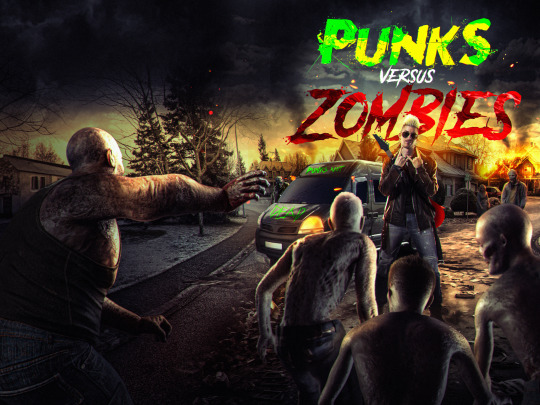
View On WordPress
#coping with crisis through fiction#Covid-19 and media trends#cultural impact of dystopian stories#dystopian fiction viewership#dystopian series#Fallout TV series#global trauma and media#pandemic and genre popularity#pandemic influence on entertainment#popularity of apocalyptic narratives#post-apocalyptic fiction#post-COVID entertainment trends#psychological effects of dystopian tales#resurgence of dystopian fiction#streaming trends in dystopian series#The Last of Us TV series#viewing trends post-pandemic#why dystopian fiction resonates#Wool TV adaptation#zombies
2 notes
·
View notes
Text
My Life as a Queer Refugee: A Story of Struggle, Survival, and Hope
As a queer person, I once believed I could live authentically in my home country. But as I came out, everything changed. What I thought was a community that might support me turned against me, and I found myself in danger, rejected by family, friends, and society. Forced to flee my home to seek safety, I traveled to Kenya hoping for asylum, only to face even more hardship. Now, living in yet another country, I continue to struggle, not only with the trauma of being a refugee but with the daily fight to survive as a queer person.
My journey as a queer refugee has been one of immense pain and loss. When I left my country, I was running from violence—both physical and emotional. In Kenya, I hoped to find protection and safety, but what I encountered was indifference and exclusion. I wasn’t safe there either. Once again, I had to flee, moving to a neighboring country in search of refuge, but the discrimination followed me.
Living as a refugee is already incredibly difficult. The lack of basic necessities��food, medication, housing—is a constant strain. But being queer adds another layer of struggle. I often find myself isolated, marginalized by both the community I seek to integrate with and the very system that is supposed to protect me. There is no safety net, and the fear of violence or rejection is a constant presence in my life.
The systems in place often fail us. Many refugees are denied the support they desperately need, not because they aren’t worthy, but because their identities—especially their queer identities—make them vulnerable to further discrimination. The global refugee system has not yet adequately addressed the unique needs of LGBTQ+ refugees, and this is why the suffering continues.
What’s worse is that it’s not just about the physical survival—it's about the emotional toll it takes. Every day I fight to exist as myself, but too often, the world makes it feel like that’s a fight I can’t win. My story is not unique. There are countless queer refugees who face the same struggles of survival and the constant question: "Where can I go to be safe?"
But there is hope. This struggle is not just mine—it's shared by many, and it’s through awareness and action that we can make a difference. We need to advocate for better protections for queer refugees, for policies that take our unique struggles into account. We need organizations to provide not just shelter, but the mental and emotional support necessary for survival. And we need the wider public to open their hearts, understand our pain, and help us amplify our voices.
I urge you, if you’re reading this, to take action. Donate to my fundraiser. Advocate for policies that protect us, and raise awareness about the discrimination we face. Share our stories—let us be heard. The world must understand that queer refugees are not just statistics, but human beings fighting for the right to live openly and safely.


The fight is ongoing, but with support, it’s one we can win. I am more than my struggle, and together, we can ensure that every queer refugee has the chance to live without fear, to be themselves fully, and to survive with dignity.
#queer pride#lesbian pride#lesbian#pansexual#bi pride#happy pride 🌈#pride flag#queer#trans community#trans man#gofunds#please help#send help#nonbinary#no one is free until we are all free#pansexaul#asexual#lgbtqiia+#lgbtiq#lgbtq community#viral#lgbtq#trans pride#love not hate#love is love#i speak#my story#refugees#asylum seekers#donate
746 notes
·
View notes
Text
Help my family survive the continuing war in gaza
Hello, my name is Mohammed Saqr, from North Gaza.


we want dreams and love for life like any young person in the world. I joined Al-Quds Open University to fulfill my dream of studying like any young person in the world, but it seems that I will not be able to achieve my dream because of the brutal war on the Gaza Strip, which destroyed our entire house, and I lost everything I owned and relied on to achieve my dream, including my laptop, university books and library.
We are a family of 12, displaced from our home in North Gaza to the southern areas under inhumane conditions.
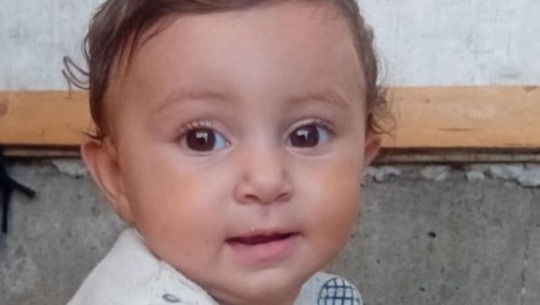
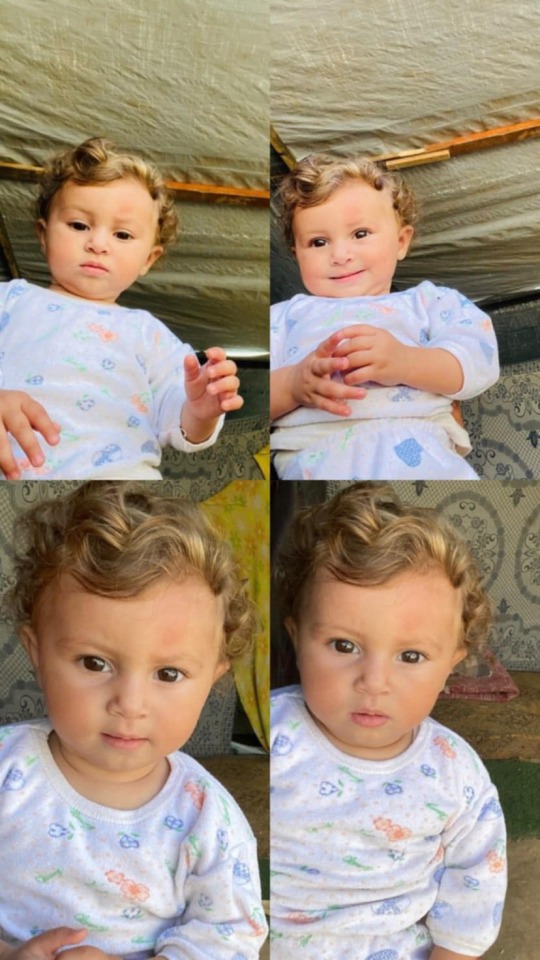
This is my daughter, who grew up in the middle of the war, no kid should go through this kind of childhood and trauma. its unfair and we can’t do anything about it to give our kids the lovely childhood that they deserve.



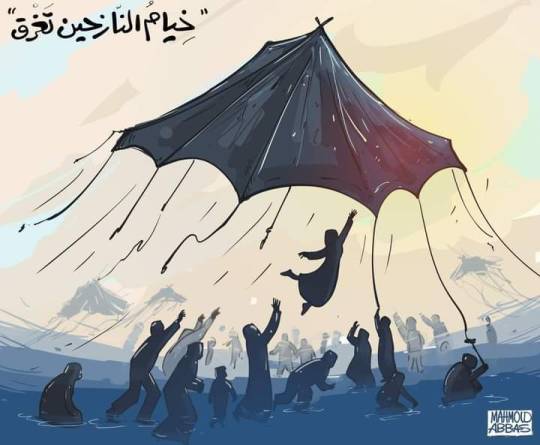
I am appealing to you, the global community, for help. I have started a GoFundMe campaign with the aim of raising 30,000 Euros to enable me and my family to find safety in Egypt. The evacuation fees change from time to time; we currently expect a cost of between 4,000-5,000 dollars per person. Any additional funds generated will go towards supporting my immediate needs and those of my family. There are various obstacles that we will face on the other side, and I hope that we can make some things easier for us.
I would like to update you on the situation now that the war has intensified. We are fine and safe, but life has become very difficult now all around us, people are suffering more and losing loved ones every day. As a family, we have literally lost everything we own, our homes and businesses, but we are trying to remain optimistic by thinking about evacuating and we heard good news today that the borders may open soon. We pray that this is true.
Once we are evacuated, we will try hard to rebuild a small part of what we lost in Gaza. If we can achieve our ultimate goal, we will have the funds to start a business to support our entire family. We want to be able to start over and not suffer anymore in Egypt. If everyone can help us with a small donation to achieve our ultimate goal, we will be able to rebuild our lives after everything was destroyed.
All the positive words cannot express how generous you are especially in sharing my posts to inform other donors about the people of Gaza who are still suffering from the terrible conditions caused by the unjust war on Gaza. Please continue to support the most just cause in the world either by donating directly or by sharing the link to other media. Do not hesitate to help people in difficult and miserable times until the dark days are over.
#donations#free gaza#free palestine#gaza#gaza aid#gaza fundraiser#gaza genocide#gaza gfm#gaza gofundme#gaza strip#palestine gfm#gfm#gofundme#fundraiser#go fund me#donate#stand with gaza#palestine#help gaza#family#palestine fundraiser#funding#donation#please help#send help#pls help#help#need help#artists on tumblr#artwork
756 notes
·
View notes
Text
On the Evolution of “Happily Ever After” and Why “Nothing Lasts Forever”
A reflection inspired by Good Omens 2
One of my favorite Tumblr posts on the second season of Good Omens 2 was actually not about the series at all, but our reaction to it, primarily the ending. @zehwulf wrote, “I think a lot of us—myself included—got a little too comfortable with assuming [Aziraphale and Crowley would] work on their issues right away post-Armageddon.” We did the work for them through meta, fanfiction, fanart, and building a plethora of headcanons. Who among us AO3-surfing fans didn’t read and love Demonology and the Tri-Phasic Model of Trauma: An Integrative Approach by Nnm?
In the 4 long years since season one was released, we did more than seek to understand and repair rifts between two fictional beings: we were forced to reckon with ourselves too. We faced a global pandemic, suffered traumatizing losses and isolation, and were forced to really and truly look into the face of our atrocities-ridden and capitalistic world. The mainstream rise of Diversity, Equity, Inclusion and Justice work, and our participation in this work, showed us that the systems in place were built to oppress and harm most of us, and they are.
So, what does this have to do with the evolution of “happily ever after”?
My friend put it best in a conversation we had following the season finale, when she pointed out a shift in media focus. The “happy end” in old stories about wars and kingdoms used to be “we killed the evil old king and put a noble young king in his place and now citizens can live in peace” and we’re transitioning into a period of “we tore down the whole fucking monarchy.”
If we look at season one, written to follow the beats of a love story, it comforted us by offering a pretty traditional happy ending pattern: you get your fancy dinner with your special someone, the romantic music plays, and you have a place to call your own. Season one’s finale provided a temporary freedom for Aziraphale and Crowley, the “breathing room,” but it didn't solve the problem that was Heaven and Hell, or the agendas belonging to those systems of oppression.
Is it good enough to keep our heads down, pretend the bad stuff isn’t happening, and live our own personal happy endings until we die? Moral quandaries aside, if you don't die (or if you care about the generations after you), then, like Aziraphale said, it “can’t last forever.” There’s a clear unpleasant end to the “happily ever after” that’s based on ignoring our problems– it’s the destruction of our relationships, and humanity.
Ineffable Bureaucracy can go off into the stars because they do not care about humanity.
You know who does?
Aziraphale.
And Aziraphale knows that Crowley cares about humanity too. (He knows because Crowley was the one who proposed sabotaging Armageddon in the first place, who only invited him to the stars when he thought all was lost, because Crowley would save humanity if he thought it was possible, and Aziraphale knows Crowley has survived losing Everything before, and he will do all in his power so that Crowley does not need to experience that again.)
In season one and two, we see how much they care about humanity, beyond their orders, to the point The Systems begin to frown at them. Aziraphale hears Crowley’s offer to run away together in the final episode of season two, to leave Earth behind, and just like the first time that offer was made in season one, he declines. He knows choosing only “us” is not a choice either of them can live with for the rest of eternity.
I believe season 3 will provide an opportunity to “dismantle the system,” but I don’t know how it will play out. I worry that Aziraphale has put himself in the now-dead trope of the “young noble king.” (I wish Crowley had told him why Gabriel was dismissed from his duties.) I worry that he would martyr himself as a sole agent for change. I worry that he doesn’t actually know how to dismantle anything by himself: because you can’t. He needs Crowley. He DOES. He needs Crowley, and Muriel, and other angels and demons and humans without fixed mindsets to help him. Only by learning to listen and making room at the table for all can they (and we) move past personal satisfaction to collective liberation.
Crowley was right when he said that Aziraphale had discovered his “civic obligations.”
So, I think we will get our modern-day happy ending– and it’s going to involve a lot of pain and discomfort, communication, healing and teamwork– and in the end, it’ll all be okay. There will be a time for rest and a time for “us.”
And most likely a cottage.
“Do the best you can until you know better. Then when you know better, do better.”
- Maya Angelou
#good omens 2#good omens#crowley#aziraphale#ineffable husbands#good omens meta#good omens 2 meta#ineffable advocacy#ineffable partners#neil gaiman#terry pratchett#gos2 spoilers#good omens 2 spoilers#nothing lasts forever#liked by Neil Gaiman
2K notes
·
View notes
Text
Happy Indigenous Peoples Day!
This is your reminder that the Alaskan Malamute is NOT an indigenous dog breed. It may have indigenous ancestry but its creation, the standards imposed on it, and every aspect of its direction have been steered by white people from the very beginning. Even it’s name is inaccurate to its ancestry.
There are still Inuit breeding traditional sled dogs today. They are not some mythological people of old. They’re uploading photos their dogs, their hunting, their friends, their communities to social media as you read this.
Inuit dog breeds such as the Canadian Inuit Dog and Greenland Dog share struggles the Alaskan Malamute never has. The Canadian Inuit Dogs were culled en mass in the 1970s by the Canadian government which is still a source of trauma for people today. Knowledge of traditional dog keeping has been so fractured that I know of several young people using YouTube to learn their traditional crafts instead of being taught by people in their communities. The Greenland Dog is perhaps one of the most isolated dog breeds in the world and is extremely vulnerable to changes from Global Warming. As the climate warms it is harder and harder for the dogs and the people that seek to continue their traditional way of life to function as they desire. Much of Greenland subsists on hunting and tourism of their landscape and traditional activities. Climate change will make both more difficult.
Yes, the Alaskan Malamute has had its own struggles, World War II took a massive toll on the breed as it did many others. But we cannot let ourselves be deluded by the false histories and mythologizing pushed by the breed club, the kennel club because at their base they are clubs ruled by the west and the west alone. Our breed went to Antarctica successfully where many breeds did not, but somehow that wasn’t enough for the people in charge. They will flush and turn their heads away when you fact check their made up delusion. They will claim the breed is SO different than the other indigenous freight dogs that they HAD to create a new breed while at the same time saying “wow this breed is ancient!”. Is the 1930s ancient? Why must we sell this lie? Where does it fucking stop.
#dogblr#alaskan malamute#indigneous peoples day#I had to smack a poster on the Alaskan malamute subreddit#for making an indigneous peoples day post that still attributed the breed to god and not Amman#they just aren’t the dog YOU think they bred for purpose#they are still breeding them for purpose#they aren’t breeding malamutes#these aren’t random village dogs people bred them for a purpose!!#please note that i say this as a lover of the AM breed in general#our history is cool but it does not HAVE to be stolen to be so#it is perfectly acceptable on its own truth
190 notes
·
View notes
Text
Mohg's Brain
(This is an essay on Mohg, Lord of Blood, from hit video game Elden Ring. It just takes a bit to get there.)


There is a story often repeated in Psychology classes, Physiology classes, pop psych media like YouTube, podcasts, and garbage daytime television on channels that used to be scientifically rigorous: about a man with an incredible brain injury. For those of you who haven't heard the story or are not yet sick of hearing it, I've included it from memory below, because I have heard it just that many times.
If you've heard this story already, you can skip to the subtitle: "Can We Even Learn Anything From Gage?"
If you already know the controversies about Phineas Gage or just want to jump to the part about the video game character, you can skip to the subtitle: "Let's FINALLY talk about Video Game"
----
"The Curious Case of Phineas Gage"

Phineas Gage was a railroad worker who would help clear land with explosives. The dubious and definitely wouldn't-have-been-OSHA-approved method of laying these explosives was to chip a hole into the mountainside, place the explosives, and then tamp it down using some sort of implement like a railroad spike. What happened next was predictable and it's surprising this didn't happen much more often--when packing the explosives, they detonated in Gage's face. Specifically, this launched the spike underneath his left eye and out of the top of his head. Less predictably, Phineas stood up afterwards. When a doctor arrived, said doctor did not believe what had occurred until Gage vomited approximately a "teacupful of brain matter" onto the street.
Due to lack of effective sterilization and antibiotics at the time, poor Phineas Gage was bedridden for several months, where he continued to lose further brain matter to infection. Eventually, he did recover, although he would continue to experience migraines and seizures for the rest of his life. While he lost his job for the railroad service, he went on to work in a sideshow attraction, carrying around the very railroad spike that went through his head. Eventually, he got a job and worked as a taxi driver and lived for several more years before dying of a seizure.
Phineas Gage was never the same after this life-altering injury: he was belligerent, drunk, lied frequently, and lost his job for the railroad company because of his new personality. And I do say NEW personality--Phineas had become like a completely different person and was, in essence, "no longer Gage" (they love quoting that). The damage to regions of the prefrontal cortex made him unable to make moral judgements, and impaired his impulse control.
OR MAYBE THAT LAST PART ISN'T TRUE.
Phineas Gage was NOT much changed by this life-altering injury. Though he lost his job at the railway company, the cause of this job loss is unknown. He MAY have had severe alterations to his personality due to this injury, but whether these changes were due to physical damage or emotional trauma--or whether personality changes ACTUALLY occurred at all--are disputed.
----
Can We Even Learn Anything From Gage?
Though I am uncertain if we have exact data on which parts of his brain he was left with when accounting for what was later lost to infection, the trajectory and angle of the injury suggests he initially lost much of his prefrontal cortex. Which of the previous versions of the story are told or over/under-emphasized is dependent on the point the teller is trying to make in the age-old debate of nature vs. nurture.
Some psychologists argue that Gage's personality change demonstrates the Global Workspace Model, where different parts of the brain are responsible for different parts of consciousness, and that by changing or removing parts of the brain, you change consciousness.
Other psychologists will argue that the LACK of change is evidence of the brain's incredible plasticity--its ability to adapt and compensate for missing parts by shifting the functions of those parts to be performed by different regions.
Most reasonably, he probably experienced some cognitive differences while still being effectively the same person and is an example of both points of view. But we don't have concrete enough evidence to say.
Any class in which a teacher or textbook needs evidence to support whatever point they're trying to make about how changes to the brain affects personality, addiction, emotional regulation, decision making, etc., they'll use Gage to make that point, no matter what stance they take. So really, Gage isn't a useful case study beyond what we could actually observe: he lost some of his brain and lived, while also experiencing migraines and seizures for the rest of his life.
With all of that said, if we assume that Gage experienced no changes to cognitive function or personality, I just typed out a story I am very sick of hearing for no reason. So let's assume that at least some of those observations were true.
----
Let's FINALLY Talk About Video Game
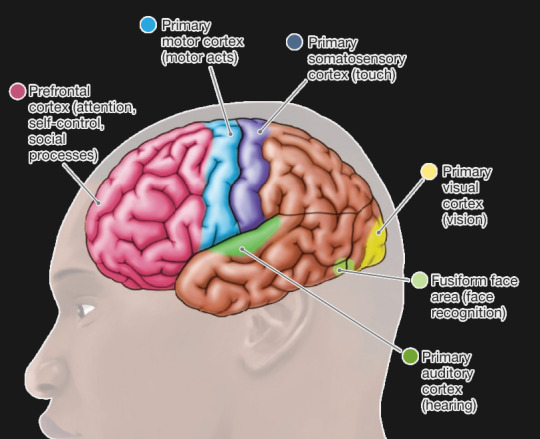
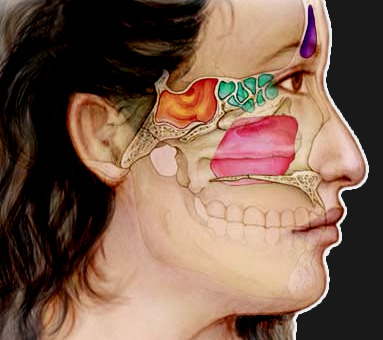
Her are some potentially useful images to reference if you want. Left: general brain regions and their functions. Right: paranasal sinus cavities.
Unlike a nice, straight tamping iron, Mohg's horns curl in unpredictable directions. Some assumptions must be made about length, depth, and diameter to determine what region and volume of his skull is occupied by his horn. The minimum I expect is that the horn occupies the region of his frontal lobe in any scenario. Let's also set a maximum limit: I believe it is reasonable to assume it has not reached the primary motor cortex, where it would disrupt body control and physical movement... unless one wants to suggest he is puppetting himself in his boss fight like a bloodbender. Which, let's be real, IS a really badass concept, someone should write that fanfiction.
Though I argue that Gage is a bad example to use given our lack of reliable data on his personality and lived experiences, we DO know that disrupting the function of the prefrontal cortex can affect judgment, planning, concentration, and any type of higher processing you might call a uniquely 'human' mental ability (I acknowledge the mental abilities of birds and primates but they are beyond the scope of this essay). It may be safe to assume that, in Mohg's case, these mental processes are harmed regardless of any further extrapolation I make. One other brain region of note is the motor speech (Broca) area, located on the left side directly behind the prefrontal cortex and controls muscle movements for speech.
On the topic of pain, migraines, and seizures: He has a horn in his head, it probably hurts. Obstructions (like cysts) can cause buildup of cerebrospinal fluid, which can cause pain and is a common cause of seizures. It is difficult to say how many people have benign brain tumors, but there is speculation that benign tumors in the brain are unexpectedly common. People only typically get brain scans when they've already noticed a problem, but there have been cases of perfectly healthy people having (non-cancerous) brain tumors, so a mass being present in the brain does NOT guarantee seizures will occur. This being said, that horn is significantly larger than a typical benign brain tumor. Migraines and seizures are very reasonable to assume.
I don't know what to say about illness and disease. In theory, if the horn grew at any point after birth, I would say he should have died from any pathogens that were introduced during its corkscrewing into his skull. Phineas Gage was bedridden for months due to infection, was under the care of a doctor, and he wasn't living in a sewer. Do the Lands Between understand the germ theory of disease? It may at least know that poop in the brain is bad, but I listen to Sawbones, so I know that isn't something we can just assume. It's possible he's lost some impossible-to-estimate amount of brain matter to infection. Feel free to speculate about Omen resistance to pathogens, but I don't feel that is the point of this essay. I'll say it's safe to assume his body has healed closed around it, but anything else I won't try to extrapolate.
----
Specificity from Horn Trajectory
Possibility 1:
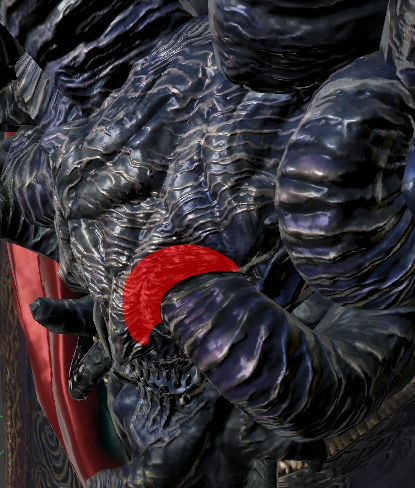
If we estimate the continued trajectory from the visible part of the horn, it actually continues medially, towards the center of the body, and curls downward. This might even miss most of the brain and instead disrupt the frontal, ethmoidal, and maxillary sinus cavities of the skull.
It may possibly even pierce the roof of the mouth, if we roughly estimate the rate at which the horn tapers and where it likely ends. I argue that this is the most optimistic scenario in terms of his health, because although the horn almost certainly penetrates the prefrontal cortex, it may not be as deep as other possibilities.
In this horn trajectory case, he probably experiences constant sinus pressure similar to a permanent head cold, obstruction to his sense of smell, and by extension his sense of taste. Even if the horn does not completely block his nasal cavity, it may have damaged his olfactory nerve and thus disabled his sense of smell anyway. Should the horn obstruct his mouth he may experience physical difficulties eating and speaking.
Possibility 2:

A worse scenario may be to assume this horn instead extends directly backwards. This would likely pass through the motor speech area, and may have caused him to lose the ability to talk, forcing him to relearn how to speak by having another part of the brain learn to do this function (similar to how anyone learns a second language after very early childhood). It may also reach the LEFT temporal lobe, which processes hearing and smell for the RIGHT side of the body, and therefore he could be deaf in his right ear. Again, the olfactory nerve is potentially in the path of the horn, and loss of sense of smell is frequently considered a symptom of brain damage, so regardless of the angle of the horn this is a high possibility.
----
What Time of Horn Growth Could Tell Us
Children are more likely to recover well from brain damage. The older he was when the horn entered his brain, the more likely he would be to experience cognitive impairment.
Should Mohg's horn have developed that way before birth, his brain may have formed around it without issue, or obstructed regions may have simply remained underdeveloped. His skull would also have developed to more 'comfortably' accommodate this horn, rather than having to break and re-heal around a later intrusion. If the horn is shallow enough and its growth occurred during fetal development or very early childhood before the fusing of the bones in the skull, it is possible that left eye blindness and mild discomfort are the only effects. The timing of the horn's growth being before birth or in early infancy is supported by the Regal Omen Bairn, which shows Morgott with seemingly all of his horns, suggesting that omens horns are largely present upon birth and that those horns grow in proportion with them.
However, given the themes associated with the Formless Mother, here is another--vastly more speculative--hypothesis: Mohg's horn was grown deliberately into his skull by the influence of the Formless Mother, perhaps with or without his consent. I find it hard to believe that a force claimed to be the "mother of truth" which "desires a wound" would be unaware of the possible effects of this type of wound.
I posit that the Formless Mother intended to compromise Mohg's consciousness and sense of reason to make him easier to manipulate. If we assume that they were not working together (debatable), the abduction of Miquella and potential interruption and sabotage of his ascension puts an empyrean under the Formless Mother's control, and works counter to the dynasty Mohg desires. Damage to his ability to plan, make rational decisions, and his sense of morality could explain how Mohg seems to want a place for outcast and hated people, likely seeing a kinship with Miquella, but has created something that is the antithesis to the Haligtree.
Furthermore, should we assume that Mohg and Miquella met previously and Miquella had the opportunity to do so, the power Miquella purportedly has to compel adoration in others may have interacted poorly with Mohg's potentially impaired emotional processing, and could have caused an obsessive outcome that the Formless Mother did not predict.
Of course, I don't believe every awful and cruel decision someone makes is the result of brain damage, but this may explain the incongruity between what Mohg seems to want and what he has made. Whether Mohg is "the reigning lord and hierarch of the coming dynasty of Mohgwyn" or "a raving lunatic" may not be an incompatible dichotomy. It may be sequential.
----
Glassbirdfeather you're so wrong, why did you say ___?
I am not a doctor. I am a chemistry student with a biology lean (clinical laboratory science) and am drawing my conclusions from what I've learned in Anatomy, Physiology, and Psychology classes at an introductory level, and I glanced back at my anatomy and psychology textbooks as my sole academic sources. Please don't take this as a well-researched essay, none of the claims I make about mental or physical health are properly cited. This is just fandom theorizing; it's as academically rigorous as fanfiction. Any doctor/member of the medical profession who would like to correct me is invited to do so, I would love to hear more accurate and informed observations.
----
Bibliography
(literally just 2 references, man)
Grison, Sarah and Michael S. Gazzaniga. Psychology in Your Life. Third Edition, W. W. Norton & Company, 2019.
McKinley, Michael P. and Valerie Dean O'Loughlin. Human Anatomy. Fifth Edition, McGraw-Hill, 2017.
535 notes
·
View notes
Note
i don't think we mention how fucking horrifying that extinction was in popular media enough. like funny asteroid go brrrrr but that's really fucking sad to me. they were here for hundreds of millions of years and just got fucking obliterated by a big enough rock.
like it was ONE DAY
ONE
most mass extinctions take millions of years
but the world literally went from
"look at this lovely biosphere, all these wonderful animals and plants and fungi and microbes, look at them doing their thing"
(Prehistoric Planet)
and then
BOOM
everything over 25 kg? dead
Anything under? Better hide from the
GLOBAL WILDFIRES
TSUNAMIS
SHOCK WAVES
and IMPACT WINTER
and hope you can find food for the next few millennia while the SUN IS BLOTTED OUT
this is *trauma*. the BIGGEST TRAUMA our biosphere has possibly EVER HAD
(there's one impact event that was bigger, 2billion years ago, but this was before life really became complex - so who knows how that affected the life at the time)
ONE DAY
change isn't supposed to fucking happen that fast
never mind such DEVASTATING change
and like, the Jurassic + Cretaceous is the longest period of relatively stable terrestrial environments on earth. The Paleozoic through the Triassic is just a lot of awkwardness, complex life stretching its metaphorical legs and figuring things out
but the J+C was a fairly stable series of succeeding ecosystems with gradual change and a few minor mass extinctions that they got through
like,,,,,,,,,,,,,,,,,,,,
WHAT
897 notes
·
View notes
Text
Laios Touden and autism; admiring the non-human
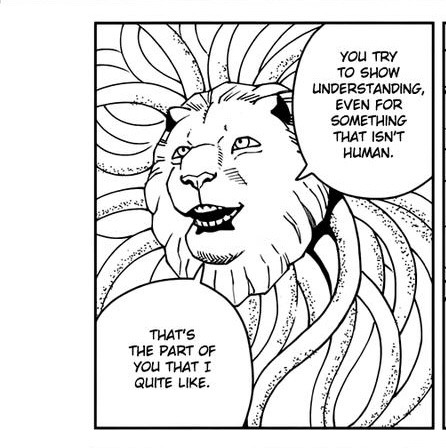
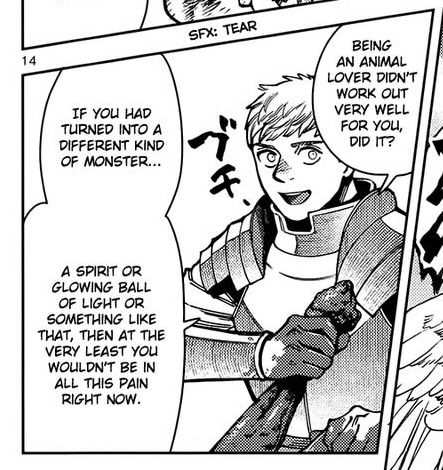
Do you think people exaggerate when they scream about Laios being autistic? Do you feel like it’s weird that so many people including autistics are so set on Laios, the problematic (but incredible and kind) king TM, being the most autistic that has ever autisticed? Why do we cheer on autistic people wanting to be monsters?? Isn’t that weird?
Well, of course it depends on the way it’s done, it can be done quite offensively, but long story short Kui blew it out of the park. The thing is, autistic people really do like monsters and animals and robots. Nonhuman does not mean subhuman, it just means Other. Feeling a connection with them has been shown to be an extremely common autistic experience for that very reason.
Because some people don’t understand why we autistic Tumblr Laios stans cheer “autism! Autism!” whenever he talks about monsters and feeling alienated to humans so! Here’s a post about how yes even research papers are analyzing the special connection we form with animals. I’m not even joking but Laios Touden & the mass cries of relatability with autistic people he gets and all the love for him could be used as study material and evidence for future papers because the link is that strong. Oh also I think it’s notable that being autistic and undiagnosed vs diagnosed makes a huge difference. In my experience as someone who was undiagnosed up until 18, it’s even more alienating to not know that there’s a reason why you’re different, being gaslit that you’re ‘normal’ and you just need to try harder and get with the program, etc. Personally when getting diagnosed I went through the 5 stages of grief because the thought of having been fundamentally different all your life (a difference which you will never be able to change) and mistreated for it when you weren’t “wrong” all along makes you unload all the anger and sadness and loneliness and sheer trauma you’ve built up over time. Like it’s world shattering.
So! Back to seeing dogs as family. Also I implore you to value experiential evidence when it comes to autism and other neurodivergences because brains are complicated and neurotypicals not being able to understand us well even with scientific research is like, a whole thing even though we’re right there speaking about how we feel and being right every time because the topic is literally us and how we experience the world.
Disclaimer for this whole post that, of course, no group is a monolith and everyone has different experiences or can diverge from the norm of the group, and that doesn’t diminish the validity of either side! Like, I know autistic people who have trauma with dogs and hate them. But, trends do happen, and in this case... Autism is very “My experiences with humans make me feel dehumanized in a bad and lonely way so instead I’ll dehumanize myself in a good and inspiring way”.
“I was treated like a failed human my entire life and you’re surprised that my response was to become a dog.” -Patricia Taxxon
It’s literally well recorded that autistic people relate to animals more than humans globally. With this post, besides spreading autistic Laios truthism and explaining why the portrayal hits so deep for so many, I want to show in what way this is a very specific experience and not looking at his character through an autistic lense really misses a lot of why he’s everything that he is. (Tacking allegedly onto here for legal reasons, different interpretations are valid etc etc /gen). This honestly isn’t super long though.
To define an important term, anthropomorphism in the studies and in this post means to attribute human traits to the nonhuman, which not only includes anthro furry designs but also animals irl, inanimate objects, and animated media as opposed to live action, to humanize them and empathize with them.

Paper: https://www.liebertpub.com/doi/10.1089/aut.2019.0027
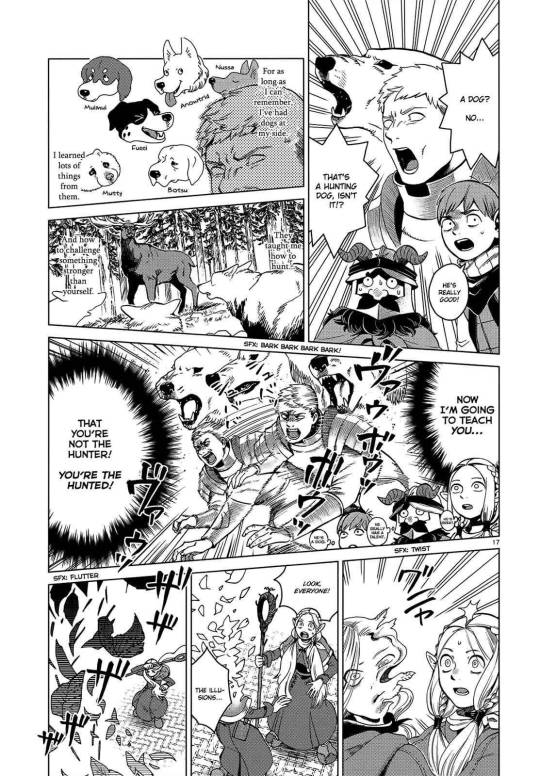
“Dogs taught me how to hunt and socialize and work in groups”, Laios having internalized body language... So real so real. I, too, make a great dog impression. And I want to emphase the part that it helps greatly develop a sense of emotions and relationships! For Laios, he didn’t get along with kids his age, it was him, Falin and the dogs against the world. Since it’s a group of dogs too, it taught him group dynamics and social hierarchies (like with Falin being considered as being below the dogs in authority according to the dogs rip), and the importance of group coordination when hunting.
For me, I cannot like, concisely explain just how much animals were important to me developmentally. I also grew up with dogs, but like I vividly remember encounters with like hamsters as well just radically shaping my understanding of boundaries, the importance of giving something space and the way you interact with them and respect their side of it. Unlike humans they don’t really mask how they feel, it’s direct cause-effect reaction and data gathering. There are no words involved, so the focus on having a perfect phrasing and tone is gone, leaving just pure interactions.
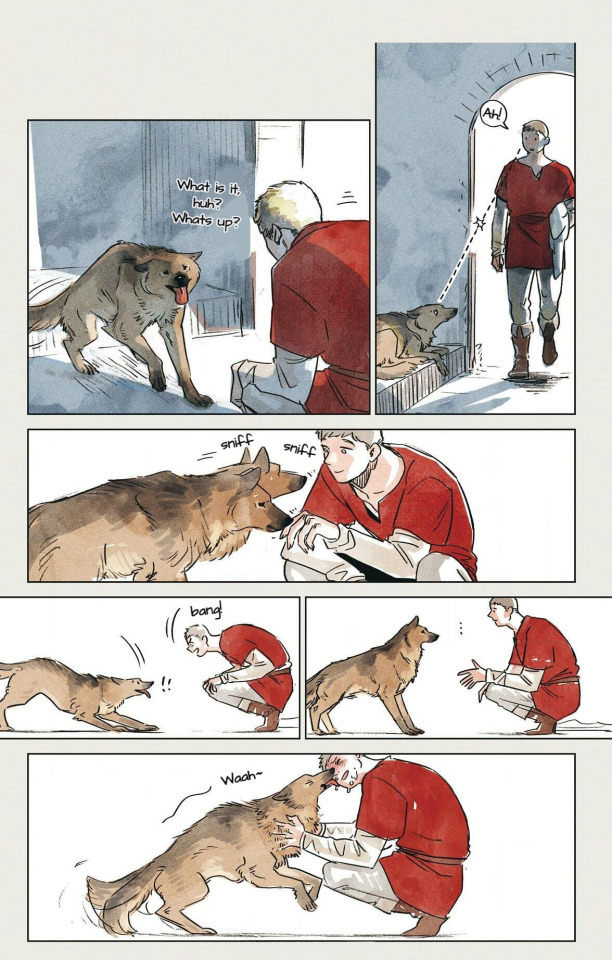
There’s also no reason to mask how you feel either, and you don’t have to feel silly over wanting to form a connection and it showing, what, is the dog gonna laugh at you because you obviously want to make friends with it? Toshiro or Kabru might, but dogs and cats will just tell you to fuck off and leave it there worst case scenario. I often say that I think one reason Marcille is special to Laios and he feels comfortable around her is because she emotes INTENSELY, she gestures, she puts her whole body into it, her facial expressions are pretty exaggerated and her ears even emote too- like with a dog’s ears!
I think there’s def also things to be said about how he gravitated towards Izutsumi at first, all excited, was eager to sleep in the same bed as her, but in the Izutsumi sleep rating chart we see they really just casual and chill so it’s not a Laios talking to Shuro deep into the night situation just a “I like sleeping besides animals” situation and that is enough to hype him up. I love how he pet her in the extra about why Chil let her sleep with him too. He’s just so transparently eager to befriend her, even if in the end they weren’t all that compatible and he accepted that.

There are honestly so many examples I could give for this. Like Grandin the famous cow lady.

More about autism & empathy:
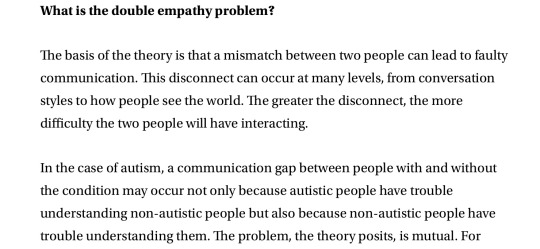
https://www.spectrumnews.org/news/double-empathy-explained/ (Also mentions a study in which groups of autistic, allistic then a mixed group played a game of telephone and both singular groups had similar levels of information retention, but the mixed group was significantly worse. As an autistic person yeah duh, obviously autistic people are different from one another and can have plenty of interpersonal issues, but communicating with other neurodivergent people feels pretty intuitive and straightforward and comfortable. One of the reasons why neurodivergent people tend to naturally gravitate towards each other I suppose.)


^ Paper: https://www.ncbi.nlm.nih.gov/pmc/articles/PMC5932358/ For good, extensive summary of why we relate to animals so much you can go to the “anthromorphizing and asd” section of the paper. This paper extends to our widespread liking of cartoons and robots as well. Ok so this is a whole thing I won’t get into here but this is a big reason why a lot of autistic people are agender leaning as well. Genders and queerness in general is a lot about social constructs, and being queer is being marginal to these, not fitting into boxes or challenging those social norms and conventions. Queerplatonic relationships are a great example of this, where the framework of the relationship is platonic but the intangible nature of what it is exactly is the point, not familial not anything but everything at once too, just adoration, I like to say having pets is a bit like it as well, bc obvi it’s not romantic and often not fully familial, very platonic but also sooo much cuddling and adoration and kissing and whatnot that you wouldn’t typically do with a friend or family member. I’ll talk about qpr and labels another day though.
I got carried away but queerness in Dunmeshi is something I 100% want to make a big post on one day. Experiencing the world with different guidelines and not registering things to have the same boxes, sigh. Personally I also relate to Laios on a gender level, “cis by default because I don’t care all that much but if I were to dig deeper I’m probably otherkin and I want to be socially associated with traits of monsters and animalistic rather than man/woman” sighh hard to be a cryptid in this day and age. I wish we had a term like furry but for monsters, I want to be in the fantasy or folk tale genre ty, like changelings. Goshh changelings... You know, the irl myth where people said their neurodivergent kids were fairies’ children instead of human. Diminished physical sense of self means I see myself as some unknowable black void aesthetic wise, but like in a way that simultaneously makes me feel seen. Like becoming a monster, losing your sense of self but also somehow just being simplified and seen for what you are, it’s weird to try and explain. This post is more about relating to the nonhuman than about seeing yourself as such, but like connect the dots right, that IS an important point of Laios’ character. It’s because our brains literally work different than allistics which makes us feel as other, but also because of social ostracization and functioning in a different way than society at large, living in the margin of society, being weird and non-conforming.
Meanwhile, animals and social norms... Like ok, showing your neck and rolling on the ground to show that you’re friendly and harmless and play biting might not be proper. But have you considered that it’s also fun and feels very intuitive. Play with a dog in the dog’s way I promise it is so nice and freeing. Play tug of war and growl back when they growl. Hiss at your cat to tell them they do something wrong, engage with them on their level.
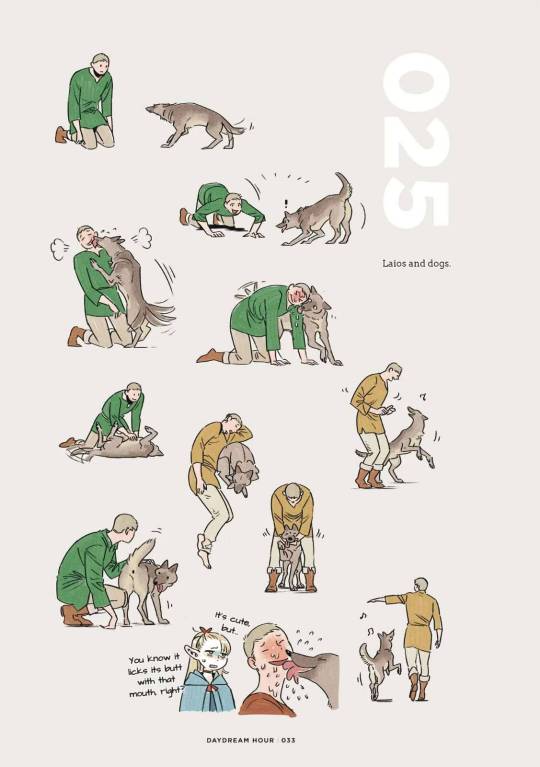
Autism made social life hard, but it made animals easy. Do you have anyyy idea how good it feels to mask all day every day and feel constantly misunderstood or like you’re doing a performance but then you can just, drop all of that in the company of animals and they understand you. They understand you. You form an understanding and rapport so easily.
And this whole thing with Laios is so explicit too, with the Winged Lion saying “You’re sick and tired of the human world”. Notice the choice of words. Sick and tired of the human world. Exhausted from the constraints, sick of the mind games. It really isn’t as much about loving monsters as it is about loving the nonhuman. Relating to them because you feel that you can actually understand how they work and think, and feeling like they could understand you back as well. Animals are safe.
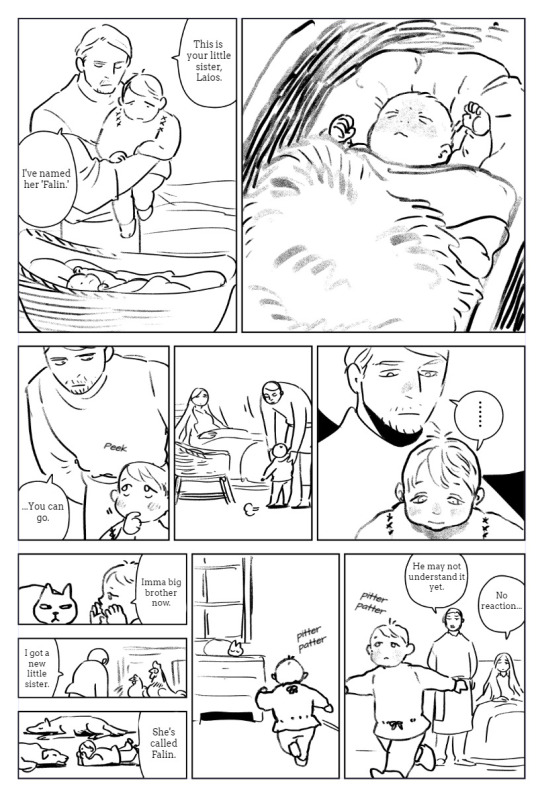
Like I could go on about how Laios admiring even just demi-humans like orcs is because they’re socially seen as non-humans more than any true physical thing, that they’re not bound by human society and its rules and live with their own lifestyle. But it would deal myself 1000 points of psychic damage and I am not ready to cry today. It’s idealization 100%, and like, Laios DOES want to be treated as human, to be valued, but it feels like an unreachable thing meanwhile becoming a monster is instant gratification and freedom and a sense that now no one will be able to hurt you in a way that reaches you, never again shall you be defenseless, and then if people dehumanize you then that only strengthens your sense of identity as a monster and UGHH ugh ugh.
And like. This post is a mess at this point but if you want to kinda delve into the more “why” then I recommend this Patricia Taxxon video essay. It starts out on a very different topic, but it’s all about autism and finding comfort in the inhuman. Long story short is othering made us like this also animals are just simpler to intuitively get along with.
So when I post this
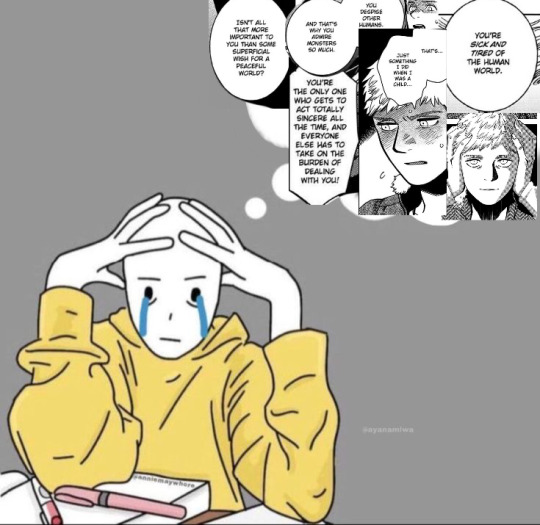
I mean it. I really mean it when I say he’s me. I have never felt so seen. So many conflicting emotions all wrapped so concisely yet so intangibly woven into the whole storyline so subtly.
Not being depicted as a monster of an human being for feeling/having felt that way?? The manga understands you. The world can understand you. Other humans can understand you. You can bond with them. You can. And I think that’s a big part of Dungeon Meshi too- Laios opening up to others about how he really is and his interests, and all the bumps on the way but how it was the only way to truly get to know each other and bond. With the climax being Laios confronting head on his complex with monsters and humans, and his monster-loving side and animalistic side being exactly what saves the whole world, what saves humanity. Because Laios does value his friends, does think humanity has beautiful sides to it, he wants to help it thrive and eat and become more accepting, carving out a kingdom for misfits and demi-humans. At the end of it, transforming into a monster and being free is a daydream fantasy, and the reality of it is that Laios does belong in the world as he is, and does receive and give out love.
If you enjoyed this you’ll probably like some of my other Laios analysis! Here’s an analysis of his succubus and what it says about his relationships with other humans. And here’s an analysis about his relationship with Shuro from his perspective.
#dungeon meshi#delicious in dungeon#laios touden#character analysis#i guess#dungeon meshi manga spoilers#spoilers#autistic laios touden#asd#autism representation#meta#draft so old it uses the old Tumblr post editor#it would be much better if i could put them side to side rip#i also wanna do an analysis trying to pin down his level of social awareness#i love that the monster story epic saga about misfits and your place in the world on an ecosystem level is just sooo autistic so perfect#this post has a weird structure but hopefully it can showcase some things and make ppl understand and others relate! I know we're out there#hiii therians how we feeling today. Brain chemistry is weird but ours is just wired different not broken#feeling self-conscious bc even with studies this is the equivalent of going 'trust me bro I get it' which usually doesn't go well with us#Humanity is beautiful <3333 Humans are social animals broski love yourself!!!
312 notes
·
View notes
Text

Dying Has Never Frightened Us: Intergenerational Trauma, Healing, & the Burden of Legacy in Castlevania
An analytical and interpretation essay that discusses how the concept of family legacy and duty can lead to intergenerational trauma in the Castlevania franchise. Focuses primarily on the Belmont who found strength from his pain by honouring his family’s legacy no matter how heavy it felt or the burden that came with it and the Belmont who found his own strength from the ones he loved and who loved him in return.
☽ Read the full piece here or click the read more for the text only version ☽
THE BURNING NEED FOR RETRIBUTION: INTRODUCTION
The world has trauma. It is deep, collective, spanning its roots over centuries and territories dating back to when the borders of today never existed, and it has largely gone untreated—but not undiscussed.
From children’s cartoons to award winning dramas, trauma has become one of the most common topics for media to discuss, depict, and dissect. It makes sense given the sort of physical and mental gauntlet which society has been through in the past five years. Sometimes even in just the past twenty-four hours. From an uptick in disasters stemming from climate change, the rise of publicised policy brutality, genocide as a result of settler colonisation, new developments coming to light after decades of denial regarding the residential school system in Canada, and of course a global pandemic which is still making ripples. Then there is the recent examination of generational trauma which differs from culture to culture. The open wounds we’ve already left and will be leaving for future age groups.
Seeing how fiction reflects reality and vice versa, it isn’t any wonder that movies, television shows, and video games find ways of processing this worldwide sensation of frustrated ennui along with the need to find answers as to how regular citizens can fix things, including ourselves, when politicians and world leaders cannot. When reality cannot provide satisfying resolutions, when we are left confused and even angrier than before due to the apparent shortcomings of institutions meant to provide relief towards the average person, it’s natural to look towards specific media. Whether for coping mechanisms, validation for this collective and personal trauma, or simply for cathartic release so the emotions don’t have to remain bottled up.
Castlevania , both its original 2017 series and the most recent entry of Castlevania: Nocturne (as well as the video games which the show is inspired by), is no stranger to this popular trend of storytelling and characterisation. Yet this trend also comes with its own controversy. When done with a deft writer’s hand and a layer of empathetic critical thinking, trauma in fiction and how we heal from its intergenerational effects can be a powerful tool in raising awareness in regards to something left forgotten by the larger public or it can allow viewers to look inwards at themselves. Done poorly or with a lack of empathy and taste, then the floodgates open.
But beyond the usual discourse surrounding trauma in fiction (how to portray a “realistic” panic attack, what makes a “good” victim, the problematic connotations of forgiving one’s abuser, etc.), Castlevania has its own things to say about the lingering effects of grief, guilt, and pain over the course of thirty-two episodes (now a fourty episode runtime with the inclusion of Castlevania: Nocturne season one). The series—particularly the first which ran from 2017 to 2021—has now gained a reputation for being one of the darker animated ventures tackling themes of religious corruption, abuse, sexual manipulation, and injustice among many others. The value and thoughtfulness of each depicted theme ranges from being genuinely compelling to delving into mere shock value yet the series is also known for its uplifting ending and cathartic release from such dark themes.
One could write entire dissertations on each complicated character and their developments. From Dracula’s suicidal tendencies as a result of unchecked grief to Isaac’s conflicted redemptive journey beginning with his unflinching loyalty to the king of vampires and ending with him forging down his own path in life. How characters such as Carmilla, consumed by her inner agonies and burning hatred towards the world to the bitter end, was left isolated from her sisters until she was forced to choose the terms of her own death, while others like Alucard, Sypha, and to an extent Hector rose above their individual torments in favour of hope and survival. However, this examination will focus on the series’ titular family of vampire hunters. Namely, the Belmont who found strength from his pain by honouring his family’s legacy no matter how heavy it felt or the burden that came with it and the Belmont who found his own strength from the ones he loved and who loved him in return.
Note: this essay will delve into speculations and purely interpretative hypotheses stemming from the author’s own opinions in regards to how they personally read the presented text. It will also discuss heavy spoilers for the majority of Castlevania games and the first season of Castlevania: Nocturne.
—
WHAT A HORRIBLE NIGHT FOR A CURSE: THE CYCLE OF TRAGEDY IN THE CASTLEVANIA GAMES
This examination begins in the exact same place as the show began with its inspirations and references: the original video games developed and distributed by Konami Group Corporations. It’s easy to get swept up in the notion that because of the technological limitations with video games at the time, the Castlevania games are devoid of story or characterization. Yet even the most bare bones of a story found in the games can still have something to say about the burden of legacy and how trauma left unconfronted has the possibility of tearing down that legacy. The most prominent example being Castlevania: Symphony of the Night , arguably the first game to begin delving into a deeper story and character driven narrative. It follows the events of Castlevania: Rondo of Blood , a game which portrayed its protagonist Richter Belmont as a force of nature in the face of evil, always knowing what to do, what to say, and emerging victorious without so much as breaking a sweat (or candelabra).
In keeping with the time of its release and the landscape of popular media particularly in Japan, Rondo of Blood feels like a traditional 1990s action anime complete with brightly coloured cutscenes and character designs reminiscent of Rumiko Takahashi and Rui Araizumi (despite the usual classic horror elements present in every Castlevania game). This is most evident with Maria Renard, the second playable protagonist who attacks with her own arsenal of magical animals and even has her own upbeat theme music during the credits when players complete the main story in “Maria mode”. Richter also shares many similar personality traits with his counterpart, namely his optimism in the face of danger and the confidence that he will be the hero of this narrative.
Of course all this changed in the direct follow-up to Rondo of Blood , the aforementioned Symphony of the Night . Arguably the new staple of future Castlevania games to come, not only did it change the gameplay and aesthetic, it changed the very core of the characters as well. The game even begins with the same ending as Rondo of Blood where Richter fights and defeats Dracula with the help of Maria. Then during the opening crawl, we discover that during a time skip, Richter has vanished and Maria is searching for him. Surely this will be nothing less than a heroic rescue and the most powerful Belmont of his century will be restored to his rightful pedestal.
Yet for the first half of Symphony of the Night , the player is faced with a sobering realisation—the villain we’re supposed to be fighting, the one responsible for conjuring Dracula’s castle back into existence, is Richter himself. No longer the hero we’ve come to adore and look up to from the previous game. Of course, the player along with new protagonist Alucard both know that something isn’t right; perhaps Richter isn’t in his sound mind or some nefarious force is possessing him to commit evil deeds. But unless the player solves the right puzzles and find the right in-game items, Symphony ends with Alucard putting down Richter like a rabid dog. However, this ending can be avoided and a whole second half of the game is revealed.
Richter’s canonical ending is left ambiguous at best, tragic at worst. He laments over his moment of weakness, claiming the events of the game were his fault despite Alucard’s insistence that confronting Dracula was always going to be inevitable. Still, the tragedy of Richter’s fate and how he is portrayed in Symphony of the Night comes much later, when it’s implied the Belmonts are no longer capable of wielding the fabled Vampire Killer, a leather whip imbued with supernatural properties that has been passed down generation after generation. One mistake and misjudgment left the Belmont legacy in a perpetual long lasting limbo with the titular hunters themselves seemingly disappearing from history as well, leaving others such as the Order of Ecclesia to pick up the fight against Dracula’s eventual resurgence. It isn’t until the height of World War II (the setting of Castlevania: Portrait of Ruin ) when the whip’s true potential is finally set free thanks to the actions of Jonathan Morris, a distant relative of the infamous vampire slaying family. However, the only way in which Jonathan can reawaken the Vampire Killer is by defeating a manifestation of the person who last wielded it and also whom the whip abandoned nearly two hundred years prior—Richter Belmont.
Yet players and fans don’t get to see it in the hands of another Belmont until the events of 1999 when Julius Belmont defeats the latest incarnation of Dracula and seals his castle away in a solar eclipse. Even then, he loses his memory until thirty years pass and he’s forced to do battle with Soma Cruz, an innocent transfer student who is also the reincarnation of Dracula. If the protagonist of Castlevania: Aria of Sorrow succeeds in defeating the cosmic threat that has awakened his supposed “evil” destiny, then Julius can finally lay down the Vampire Killer in peace (until the sequel Castlevania: Dawn of Sorrow , of course). If not, the game ends with Julius keeping his promise to Soma should he lose sight of his human side and let Dracula be reborn once again. In a scene that directly mirrors the beginning of Symphony , Julius enters the castle throne room, Soma throws down his wine goblet, and the screen goes black. The cycle continues anew. Julius has upheld the duty of his family name but at what cost.
The theme of tragedy getting passed down through different generations, permeating from person to person even with those who are not Belmonts, is a staple of later Castlevania games following Symphony of the Night . In some instances, pain and trauma is what jumpstarts the story moving forward. Castlevania: Curse of Darkness begins with its protagonist Hector in a direct parallel to Dracula swearing revenge on the one responsible for the murder of his wife; an ultimatum that follows him every step of the way, fuelling his rage and determination up until the penultimate moment when his goal is within reach. Yet even then he cries out, claiming this “murderous impulse” isn’t truly him—it’s the result of an outside force he himself once aided before defecting before the events of the game.
Something similar occurs in Castlevania: Lords of Shadow , an alternative reimagining of the franchise that while still a topic of division amongst most die hard fans has also seen a resurgence of popularity and reevaluation. It begins with Gabriel Belmont grieving over the death of his own wife (a trope which is unfortunately common amongst the majority of Castlevania titles). This is a wound that follows him throughout his journey until an even more painful and shattering twist regarding Marie Belmont’s demise is revealed to Gabriel later in the game.
However, there is one example from the games that stands above the rest in regards to the sort of damage which generational trauma as a result of familial duty and legacy, upheld to an almost religious degree, can inflict. So much so that even a declaration of retribution can evolve into a generational curse.
—
HUNT THE NIGHT: LEON BELMONT & THE MYTH OF FREE WILL
The Castlevania timeline didn’t always have a set beginning. An inciting incident by which all future stories, characters, and inevitable calamities could base themselves off of. Rather it changed from game to game until a definitive origin was settled in 2003 with the release of Castlevania: Lament of Innocence . For at least two games, the starting point was supposed to be with Simon Belmont, making his way through a labyrinth of dark forests and cursed towns, before finally traversing the ever changing fortress in Transylvania to defeat Dracula. He even went as far as to gather the remains and resurrect the eponymous lord of his own choice just to rid himself of another curse entirely.
Castlevania protagonists are always cursed by something. Whether it be the cause of Dracula’s influence, their own actions as seen in Lords of Shadow , a curse of the flesh like how Simon had to tackle his own ailment in Castlevania II: Simon’s Quest , or something else just as common as Dracula’s curse: the burden of honouring a family duty.
A basic yet iconic 1986 entry followed by a sequel that had potential especially with the first appearance of the now famous “Bloody Tears” track but suffered from a rather confusing and lacklustre end product. Then suddenly the starting point for the franchise timeline changed drastically. Castlevania III: Dracula’s Curse despite the numerical inclusion in its title stands as more of a prequel, detailing the exploits of the Belmont who came before Simon. Not much was altered in the grand scheme of things; the titular vampire hunter still essentially slays Dracula with the help of three other playable characters, said final boss having been driven mad and more violent than ever by humanity’s slight against him. However, not only were the methods by which Dracula is defeated changed but players were given more insight into the sort of burden placed upon the Belmont family name.
When the story of Dracula’s Curse begins, protagonist Trevor Belmont isn’t revered as a legend or hero but rather a blight on larger society who the people only turn to as a last ditch effort against rising evil. The regular god-fearing people of Wallachia now fear the Belmonts and their power (it is also implied that some still feared the barbarian-esque Simon despite his legendary status) so the family is excommunicated. Trevor is forced to enlist three other outcasts—or simply two other fighters, depending on which version of the story you examine—in order to carry out the family business. Even when the rest of the world has shunned them and there are plenty of others just as capable of stopping the forces of evil, a Belmont still has a destiny to fulfil.
Yet once a series has gone on for long enough, things within the established canon are bound to change—again and again. Whether through re-examination in order to line it up better with present day morals and sensibilities, or through good old fashioned retconning in favour of something more interesting, more thought out, or less convoluted. Other times, it’s simply because either the creator or viewers wanted it to happen. In 1997, this occurred with the release of Castlevania Legends on the GameBoy, a prequel to Dracula’s Curse that was meant to serve as the actual origin for the Belmonts, Dracula, and even his son Alucard. Instead of Trevor, the very first Belmont to fight Dracula is now his mother, Sonia Belmont, seventeen years old and already burdened with the glorious purpose of her bloodline.
Sonia is undoubtedly the protagonist of her own story with agency and drive. However, the game ends with a stark reminder of why the Belmonts have a place in the Castlevania universe. The last we see of Sonia in Legends is in the form of an epilogue where she holds her newborn child and states that one day when he’s grown, he will “be praised by all the people as a hero”. Despite her triumph over Dracula—a monumental feat itself—it seems that her purpose in the end (the purpose of most Belmonts other than to forever fight evil in fact) was to merely continue the bloodline so that descendants can carry out a promise made centuries before by another Belmont—someone that neither Simon, Trevor, Julius, or Richter ever knew.
The inevitability of sudden retcons within long-running media was not as kind to Legends as it was to Dracula’s Curse . Because of how the in-game events conflicted with subsequent entries (for example the implication that Trevor is actually the son of Alucard, thus further tying the Belmonts to Dracula through blood as well as duty), both Legends and Sonia were completely removed from the canon timeline. This is merely one reason why the next attempt at creating the definitive origin for the franchise, now a cult favourite among certain subsections of the fan community, was regarded with some animosity. However, twenty years after its release, Castlevania: Lament of Innocence is considered by many as an underrated entry. It is certainly the darker title where both the hero and villain stumble through their own hardships yet neither emerges completely victorious by the end.
The opening narration crawl of Lament of Innocence describes the lives of Leon Belmont and Mathias Cronqvist. They spend most of their lives as reflections of each other; one grows into more of a fighter while the second is coveted for his intellect and ambition. Both are valorous, honourable, and products of their own respective plights. Despite his service to the church, Leon is soon systematically stripped of everything save for the clothes on his back because he wouldn’t follow their orders blindly. While Mathias is forced to watch as an uncaring god (the very same god he serves) takes away a figure of pure virtue and love. This figure, Elisabeta Cronqvist who appears to be a splitting image of Dracula’s next deceased wife Lisa Tepes, was the last remaining tie Mathias still had to whatever bit of morality he still feels, which he eventually throws away when deciding to drag his only friend and everything he holds dear into hell alongside him.
The difference is how both men react to those personal horrors and how they let it govern their pasts, presents, and futures not just for themselves but for others who follow after the dust has supposedly settled. Two men, two best friends turned hateful enemies because of an interlinked tragedy. Not only that, but also because of their perspectives, morals, and the way they view a world that is unkind to them. Both were spurred by the death of loved ones, both used it as a conduit, or rather a catalyst for the radically opposing directions in which their choices take them and their families. Leon chooses to struggle onwards towards a world free from darkness and horror despite his pain. Mathias chooses to revel in that very same darkness and pain with a fire that would burn for aeons. In the end, one thing is absolute. A single thing the two men can agree upon as they flee down adverse paths: one of them will destroy the other.
Yet the timeline of Castlevania proves that this choice comes at a great cost for the Belmonts in particular. By the end of Lament of Innocence , Mathias has revealed himself to be the great manipulator pulling the strings behind the scenes. Due to the immense grief he felt over losing Elisabeta to a presumably common illness made untreatable because of the time period’s medical limitations (coupled with his own arrogance and narcissism), Mathias finally becomes Dracula. Dominion over death and even god by has been achieved by doing what Leon’s righteously moral mind cannot comprehend: transforming himself into an immortal creature driven by bloodlust. All he had to do was lie, cheat, and cruelly outsmart everyone else around him. That of course includes Leon as Mathias’ manipulation tactics were also the cause of the mercy killing of Sara Tarantoul, Leon’s fiance, to stop her from turning into a vampire herself. After watching his former friend escape before the sun can rise and disposing of Dracula’s constant right hand man Death, Leon finally feels his anger over such a betrayal boil over. He gives one final message to Mathias, now the new king of the vampires: “This whip and my kinsmen will destroy you someday. From this day on, the Belmont Clan will hunt the night.”
This is how Castlevania: Lament of Innocence ends. Unlike other entries like Symphony of the Night, Aria of Sorrow, or Harmony of Dissonance , there is no good, neutral, or bad ending that can be achieved if the player is aware of certain secrets and tricks. There is only one for Leon and Mathias. The inclusion of multiple endings in some Castlevania games versus a singular set ending in others may seem like a small coincidental narrative choice in conjunction with evolving gameplay, but it matters in the case of Lament of Innocence. From the moment Leon enters the castle to rescue his fiance, the wheel has already started turning and his fate is sealed. Mathias has already won and Sara, along with future Belmonts, are already doomed. And Leon’s ultimatum made in the heat of the moment would go on to have repercussions centuries later. “Hunting the night” gave the Belmonts purpose but it also burdened them with that exact purpose. While Dracula deals in curses, so does the Belmont family—a curse of duty that gets passed down throughout the bloodline.
Leon Belmont was of course never malicious or cruel like Mathias was. He never wanted to deliberately curse his family because he suffered and so should they. His choice was made out of anger and retribution. Still, it goes on to affect Simon, Sonia, Julius, and others in drastic yet different ways. Yet in the case of specific Belmonts like Trevor and Richter, we see how this family legacy can have varied consequences in far more detail through the introduction of animation and serialised writing into the Castlevania franchise.
—
SOMETHING BETTER THAN A PILE OF RUINS: TREVOR BELMONT & STRENGTH FROM LEGACY
If there’s one thing that Castlevania makes abundantly clear with its four season runtime, it is that trauma does not inherently make people better or more virtuous. We of course see this from the games with Mathias and his personal crusade against god which leads to the complete dissolvement of his closest friendship. Or with Hector and the rage he feels towards his wife’s murderer, who also happens to be his former comrade under Dracula’s employment. Even Leon’s promise to both his friend, now his most despised enemy, and future descendants can also be an example of how gut reactions to pain, grief, and betrayal can have damaging consequences in the long run. This particular dissection of trauma when it affects a survivor negatively and in almost life-altering ways while still giving them a chance at achieving their own method of healing is most apparent with the animated representation of Trevor Belmont.
At its core, the first season of Castlevania airing in July of 2017 with four episodes in total is inspired by the events of Dracula’s Curse with the following seasons taking more from Curse of Darkness along with original story elements. It begins with the brutal execution of Lisa Tepes after she is falsely accused of being a witch. Shortly afterwards, Dracula declares war on all of humanity in an explosion of grief-riddled vengeance (a declaration that is not dissimilar to Mathias’ cursing of god after Elisabeta’s admittedly more natural death). Hundreds of civilians are slaughtered in the capital city Targoviste and hoards of night creatures descend upon more townships across Wallachia.
This would be the perfect opportunity for a Belmont to stand up and fight back except there is one problem: the Belmonts have been eradicated from this world on false grounds of black magic and aiding the vampire lords instead of hunting them—much like how Lisa was slandered and paid the price with her own life.
The only Belmont left surviving is Trevor himself and his introduction does not paint him in the most optimistic or even heroic light. In the midst of being excommunicated by the church, he’s been wandering aimlessly for the past few years while languishing in whatever tavern he stumbles upon. In one particular bar Trevor finds himself in, he overhears the other patrons cursing the Belmonts and blaming them for Dracula’s siege upon humanity. He tries to stay out of it and not bring too much attention to himself until one glance at the family emblem stitched into his shirt breast is enough to ignite an all out skirmish.
Trevor hides his true identity not because he’s ashamed of it, but for his own safety and self preservation. In fact, the opinion he holds of his family is the total opposite from disdain for the sort of legacy they have saddled him with even in death. He reacts strongly to false accusations directed towards the Belmonts, angrily correcting the bar patrons by stating that his family fought monsters. However, he quickly realises he’s said too much and tries saving face by once again detaching himself from possibly being connected to the aforementioned Belmonts.
It’s only when Trevor is backed into a corner and is fresh out of snappy drunk retorts (thanks to a few hard hits to his nether regions) does he finally admit to his real lineage. As mentioned earlier, Trevor finds himself caught up in the first real brawl of the series not because of the pride he feels in himself but the immense pride he feels for his bloodline. All the while, he’s given up trying to hide what he is—a Belmont—and what he was born to do—fight fucking vampires.
Every time Trevor has the opportunity to bring up his bloodline whether in a fight or in conversation, it’s usually spoken with some bravado and weight even when he’s inebriated. However, when visiting the ruins of the Belmont ancestral home in season two and thus directly confronted with what little remains of his family legacy, Trevor loses all that previous bluster and becomes far more contemplative. He doesn’t reveal much of what it was like to actually live as a Belmont, only that it was “fine” and “no one was lonely in this house”. Even when staring up at the portrait of Leon Belmont, he says nothing and instead firmly grips the very weapons which his ancestor must have also wielded.
It’s clear that Trevor feels no shame, bitterness, or lack of respect towards his family history despite the hardships that have come with it. Still, it’s difficult for him to truly accept the duty of being a Belmont and Trevor continually struggles with it over the course of two full seasons. Upon arriving at the ruined city of Gresit which is under constant threat of night creature attacks, Trevor doesn’t seem particularly concerned with the people’s plight or with helping them. He inquires about what’s been happening by speaking with a few local merchants but it’s only in order for him to gain a better picture of the situation that Gresit finds itself in. Otherwise, he’s simply passing through on his way to another tavern, fist fight, sleeping spot, or all three. Until he puts aside his own needs for self-protection in favour of saving an elder Speaker (a fictionalised group of nomads original to the Castlevania show who have made it their mission to help less fortunate communities and pass on their histories via oral tradition) from a potential hate crime committed by two supposed men of the cloth.
This moment acts as a representation of the first chip in Trevor’s carefully maintained armour. During the bar fight, he claimed over and over again that he was a Belmont in both skill and purpose. However, Trevor hasn’t done much to prove such a proclamation. Because of his ennui and poor coping mechanisms due to lingering trauma, he’s been all talk and not a lot of action—until this point. At first he tells himself to walk away, this sort of confrontation doesn’t concern him. Then he remembers where he comes from and uses the very same family heirloom to help someone physically weaker than himself.
Yet when he accompanies the elder back to where the other Speakers have found shelter from the monsters repeatedly demanding their heads as well as future night creature attacks, Trevor’s metaphorical walls are erected back up. He won’t take any part in this eradication of humanity whether as a victim or perpetrator and especially not to stop it. The people of Wallachia made their choice in the unjust murder of Dracula’s innocent wife, they made their choice when they decided to massacre what was left of his family, and the church made their choice when they decided to fight Dracula’s armies themselves without the Belmonts. Why should he lift a finger (or whip) to save the masses?
Despite this nihilistic attitude, Trevor proves to be a poor defeatist. He still desperately wants to protect the Speakers and warns them of an oncoming pogrom planned for them. A massive hate crime fueled by superstition and facilitated by the corrupt Bishop of Gresit which will supposedly save the city from night creature ambushes (this can be interpreted as a direct allegory meant to comment on how minority groups such as Jewish and Romani communities were used as scapegoats during the Mediaeval period). However, the Speakers refuse to budge and decide to face the angry and misled crowds head-on. They instead tell Trevor to leave in their place which, in a burst of frustration, spurs him to finally act like a member of his clan should.
What follows next is one of the most defining moments of the series for Trevor, cementing his place as a Belmont. Another corrupt member of the church demands to know what he could possibly stand to gain from fighting back considering his downtrodden state and the fact that he’s entirely outnumbered. Trevor’s answer is simple: nothing. The Belmonts don’t protect everyday people for any great reward or because of any strong personal ties. They do it because it’s their duty and the right thing to do. Trevor even mirrors something which the elder Speaker told him; a family mantra that encompasses the very purpose of the Belmonts, dating back to Leon: “It’s not the dying that frightens us. It’s never having stood up and fought for you.”
Trevor’s healing journey does not end at this moment. He still has moments of hesitation where someone like Alucard has to forcibly remind him of his place as Belmont, saying he needs to choose whether he’s really the last of a long line of hunters or a drunkard. This leads to a fight sequence that nearly spans the length of an entire episode where Trevor further proves himself by taking on at least three different creatures all with varying degrees of strength, skill, and fortitude. Episode six of season two is the ideal example of not only Trevor’s determination but also his quick thinking. Moments such as him wrapping his cloak around his hand so that it doesn’t get cut while his sword slices through the throat of a minotaur or using a set of sticks to beat against an adversary when his whip is knocked away. Being a Belmont means using one’s intellect (no matter how unconventional it may seem) as well as one’s muscles.
There is also another albeit less violent instance at the start of season three where he still feels the need to hide his surname while in an unfamiliar village. Then there is the revelation that malicious stories about the Belmonts and their supposed demise still circulate amongst rural Wallachian communities. Yet despite coming from a family of old killers (a term Trevor uses before facing off against Death in the final season) his family name remains his strength and the weight of both the Vampire Killer and Morningstar whip keep him grounded rather than burden him. The Belmont name carries such weight throughout the series that by the end, there is strong consideration from Alucard of naming a new township nestled in the shadow of Dracula’s castle after that family.
Trevor deals with his pain and trauma quietly, almost numbing it with the assistance of alcohol and dodging the harder questions regarding what his family was really like. He still finds strength in remembering what the Belmonts are here for despite the tribulations that come with the family name. Hardships that continue and evolve nearly three hundred years later.
—
THE THINGS THAT MAKE ME WHO I AM: RICHTER BELMONT & STRENGTH FROM LOVE
Depending on what sort of mood you might find the author of this essay in, their favourite Castlevania game will vary. At the moment, it’s a three way tie between Symphony of the Night for its artistry, Lament of Innocence for its story and characterisation, and Aria of Sorrow for its evolved gameplay. However, one personal decision remains relatively consistent no matter the mood or time of day: Richter Belmont is the author’s favourite Belmont and the inclusion of him in the latest animated adaptation Castlevania: Nocturne has only cemented that fact.
It makes sense from both a narrative and marketing standpoint as to why we’ve suddenly gone from the events of Dracula’s Curse/Curse of Darkness depicted in the previous series all the way three hundred years later to Rondo of Blood . Narratively, Richter and his companion Maria Renard already have a direct link to Alucard through the events of Symphony , which Nocturne will most likely cover and be inspired by in its second season. Marketing wise while also appealing to the largest demographic possible (even those less familiar with the games), amongst more recurring characters like Dracula and Alucard, Richter is arguably one of the most recognisable Castlevania figures right down to his design.
Certain traits and visual motifs of other Belmonts have changed drastically over the years and with each iteration. Meanwhile, from Rondo and Symphony , to Harmony of Despair and the mobile game Grimoire of Souls , to finally Nocturne and the inclusion of Richter as a playable character in the fighting game Super Smash Bros Ultimate , specific elements of Richter never waver. This includes his blue colour scheme, his tousled brown hair, and his iconic white headband. All of which carry over in the first season of Nocturne which not only expands upon Richter’s character first established in Rondo of Blood but also further examines said character.
For example, Richter’s true introduction directly following the downer cold opening is without a doubt the farest cry from Trevor’s. While Trevor’s first scene acted as a sobering depiction of what happens when physically/mentally damaging coping mechanisms mix with unacknowledged grief, Richter’s first fight gets the audience’s blood pumping, complete with a triumphant musical score and a showcase of his skill with the Vampire Killer. Richter is cocky, but not reckless. He’s sarcastic, but not sullen like Trevor was. Because of his upbringing after the death of his mother, filled with positive affirmations, he values the wellbeing of others along with their fighting experience. Yet his confidence does not overshadow his acknowledgement of the family burden. Richter is well aware of how heavy the Belmont legacy and duty can weigh upon an individual’s shoulders along with how closely it can tie itself around a person’s life and their death—a reminder as well as memory which haunts him for nine years.
When Nocturne begins, its first major fight sequence takes place between Richter’s mother Julia Belmont (an original character for the show) and the vampire Olrox, an enemy taken from Symphony of the Night now reimagined as a seductive, complex Indigenous vampire on his own path towards vengeance against the very person who took away the one he loved most in this world—just one of many thematic parallels to the first series, this time referencing Dracula’s motives and justification for his grief. Just when it seems like Julia has the upper hand thanks to her magical prowess, Olrox transforms and ends her life in a swift yet brutal manner. All of which happens right before ten-year-old Richter’s eyes.
Julia was simply doing her duty as a vampire hunter and her life as a Belmont ended the same as most of her ancestors did: in battle while fighting for the life of another. Why then did it hurt Richter most of all? Why does it haunt him well into his early adult years? And why was it seemingly more so than how Trevor’s trauma haunted him? There are two probable answers to this, one being that Richter was only a child, directly confronted by the cause for his mother’s sudden and graphic death with no way of fighting back despite being a Belmont.
In the case of Trevor, although he was a few years older than Richter when his entire family and ancestral home were burned in front of his eyes presumably by the same people they were supposed to be defending, the circumstances which followed them afterwards are vastly different. For nine years Richter was surrounded by those who loved and cared for him whereas Trevor only had himself and the hoards of average Wallachians who hated him because of superstitious rumours and the church’s condemnation. Trevor had over a decade’s worth of experience in becoming desensitised to his pain and trauma, masking it beneath self deprecation and numbing it with alcohol. He wasn’t even aware of the fact that he was a deeply sad and lonely individual until Sypha pointed it out to him.
Despite his bravado and brighter personality than his ancestor, Richter is also an incredibly sad, hurt person who suffers somewhat from tunnel vision. He obviously has empathy and wants to protect people from monsters, vampires, and the like. More so than Trevor did during his introduction before his moment of self-made rehabilitation. However, he doesn’t seem to care much about the revolution itself or what it stands for. He attends Maria’s rally meetings but he doesn’t take active part in them, opting to stay back and keep a watch out for any vampire ambushes. He admits that he doesn’t really listen to Maria’s speeches about liberty, equality, and fraternity. And in the most prominent example of his disillusionment with fighting for a larger righteous cause, when given a revolutionary’s headband, he shoves it into his pocket and mumbles about how tired he is of everything.
This could be interpreted as defeatist if Richter wasn’t already trying so hard to uphold his family duty and maintain a level head. He needs to have a sense of control and almost achieves it until Olrox so casually confronts him in the middle of a battle which Richter and his friends seemed to be winning until they’re forced to flee close behind him. When Richter runs away and emotionally breaks down the moment he’s finally alone, it isn’t because he’s weak or cowardly. On a surface level, it was due to his fear and panic over not being able to face his mother’s killer (someone who has proven to be much, much stronger and more powerful than any Belmont). Yet it was also a form of harsh admission to himself. He couldn’t maintain that aforementioned sense of control and perhaps he never will, not where he is right now at least.
It isn’t until he’s reunited with his grandfather Juste Belmont (long thought to have died, leaving Richter as the final Belmont) that this negative mindset brought on by unresolved trauma begins to shift. In many ways, Juste is another callback to what happened with Trevor. He suffered an immense tragedy in the past and has since spent his entire life drifting from tavern to tavern, avoiding his own grandson and instead leaving him in the care of people far more capable of raising him and instilling better morals within the youngest Belmont.
Other mentor-esque characters appear in Nocturne such as Tera who raised Richter alongside her biological daughter Maria. There is also Cecile, the leader of a Maroon group which Annette joins after escaping slavery. Despite their individual pains, these two women maintain the hope that humanity can be changed and the evils of the world can be defeated. Meanwhile, Juste has thoroughly lost his own hope. He reveals to Richter that “evil will always win” because of how it permeates everything and is far stronger than any Belmont, even the most magically inclined members. No matter how many Draculas, Carmillas, or Lord Ruthvens are defeated, it will always find a way to creep back to the surface whether through the upper class of France or through the very colonisation that nearly wiped out Olrox’s people or enslaved Annette’s family.
One of the first things that Juste says to Richter directly references the sheer weight of the Belmont legacy, all of which culminates within the whip itself. This can also be a reference to the Vampire Killer carrying a living soul as Leon Belmont was only able to awaken its true power by sacrificing Sara Tarantoul. The whip has both a metaphorical and literal weight which the Belmonts must come to terms with.
Yet for Richter, family is maintained not through blood ties, which can easily die out or be abandoned because of generational trauma, but through the people we find and attach ourselves to. Under the immediate threat of losing his found family, all of Richter’s pain and anguish explodes when his magical powers violently return to him in one of the most visually impressive and cathartic moments of Nocturne season one, complete with an orchestral and operatic rendition of “Divine Bloodlines” taken straight from Rondo of Blood as he ties the same headband he nearly discarded earlier around his head. Then once the dust settles and Richter is asked by Juste how he managed to tap back into that great power, he simply responds with the most obvious answer he can come up with: there are people who love him and he loves them in return.
This is reiterated when Richter is reunited with Annette and describes the same revelation when she asks how he was able to regain his magic. Not just a mental revelation but for Richter, it was a physical sensation as well. Just when he believed he had lost everything, something reminded him of all the things worth protecting in his life and all the pain he’s had to endure.
Richter finally donning his iconic white headband is symbolic of not only his decision to actively join the French Revolution but also his revelation that the love he feels for Maria, Annette, and Tera is his own righteous cause. That, to him, is worth defending just as much if not more than the concept of a centuries old curse turned legacy.
—
SLAVES TO OUR FAMILIES' WISHES: CONCLUSION
Richter, both his game depiction and his recent Nocturne iteration, acts as a reflection and subversion of what a Belmont is along with what that family duty means to different members. Trevor found healing from his trauma through his duty. Richter found his healing through love. Of course Trevor loved Sypha and Alucard in his own way, but throughout the entire first series, from the moment he removed his cloak at the end of season one to standing up against Death in the finale, his driving motivation was always to preserve his family’s legacy despite his own shortcomings. The Belmonts were all but gone and Trevor had been exiled, excommunicated, and turned into a societal pariah. Had he given into despair and continued with his vagabond ways, who else would wield the Morningstar, the Vampire Killer, or any of the knowledge cultivated by previous Belmont generations?
But for Richter, family legacy is more of a nebulous concept. It gets mentioned in conversations and we see its varying effects on individuals, but even when Richter is reunited with Juste, the immediate priorities of his found family takes the place of his blood family. This, according to him, makes him a Belmont.
It is also important to consider that we are still only on the first season of Castlevania: Nocturne with season two having been renewed and in production merely a week after its initial premiere. With the reveal of Alucard as a last minute cliffhanger in the penultimate episode, it will be interesting to see how his own characterisation as well as his close tie with both the Belmonts and his own family burden will further develop especially after three hundred years within the show’s timeline. One of the biggest possibilities is that in contrast with his youthful brashness and instability that was the crux of his character in the first series, Alucard might serve as a sort of mentor figure or perhaps his own generational pain will bond him further to Richter and Maria, more so than he was in Symphony of the Night . Then there is the question of whether Richter in the midst of the apparent losses he suffered during the finale of season one will follow down the same path that his video game counterpart did.
In 2020, the author wrote another Castlevania -centric essay which detailed the visual, thematic, and aesthetical shifts of the franchise from its inception during the 1980s all the way to the 2017 adaptation through focusing on how these changes affected Alucard. By the end of that essay, it was mentioned that despite the show being renewed for at least one more season, the overall future of Castlevania remained unknown. This is still the case for now.
Though one can make educated assumptions and theories, there’s no way of knowing what sort of direction season two of Nocturne will take with its themes and characters. This is doubly true for the games themselves. Despite the anticipated releases of the Silent HIll 2 and Metal Gear Solid Delta: Snake Eater remakes, as of now Konami has not revealed any official decisions to remake, rerelease, or produce new Castlevania titles. One can hope that due to the success of both shows along with the anticipation for Silent Hill and Metal Gear Solid remakes that something new will be in store for Castlevania in the near future.
Castlevania , both its games and animation adaptations, prove that there is a place in this world for every kind of story. In the last episode of season one airing in July 2017, Alucard states what could very well be the thesis of the entire franchise: “We are all, in the end, slaves to our families’ wishes”. Yet even if we cannot escape the narrative we’ve been latched onto or, for dramatic purposes, cursed with, there are ways in which we can combat it and forge our own healing process.
—
MEDIA REFERENCED
Castlevania (1986)
Castlevania II: Simon’s Quest (1987)
Castlevania III: Dracula’s Curse (1989)
Castlevania: Rondo of Blood (1993)
Castlevania Legends (1997)
Castlevania: Symphony of the Night (1997)
Castlevania: Aria of Sorrow (2003)
Castlevania: Lament of Innocence (2003)
Castlevania: Curse of Darkness (2005)
Castlevania: Lords of Shadow (2011)
Castlevania (2017—2021)
Castlevania: Nocturne (2023—)
#castlevania#castlevania netflix#castlevania nocturne#trevor belmont#richter belmont#leon belmont#castlevania symphony of the night#my writing#god its been so long since i wrote an actual essay pls be gentle with me.....
432 notes
·
View notes
Text
The war unleashed by Russia almost three years ago in Ukraine is rightly recognized as one of the great crimes of the twenty-first century. Understandably, little attention has been paid so far to the impact the conflict is having on Ukraine’s international image. And yet amid the trauma and horror of Russia’s invasion, there are growing signs that the unprecedented media spotlight on Ukraine since 2022 is gradually helping to transform global perceptions of the country. As a result, Ukraine is now finally emerging from a prolonged period of international obscurity that has hindered the country’s progress for centuries.
International ignorance of Ukraine has been a feature since long before the country regained independence in 1991. Following the Soviet collapse, little was done to address this lack of outside awareness or strengthen Ukraine’s national brand in the global arena. This low profile helped set the stage for Russia’s disinformation efforts, with foreign audiences often prepared to believe all manner of outlandish lies about a country that was otherwise unknown to them. Thanks to the recent media focus on Ukraine, Kremlin propagandists are now finding that their distortions are not so readily accepted. This is an ongoing process, but it is already possible to identify a number of important facts about Ukraine that have taken root in the international consciousness since the start of Russia’s full-scale invasion.
1. Ukraine is not Russia
The fact that Ukraine is not Russia may seem insultingly obvious when viewed from a Ukrainian perspective, but in reality this was the fundamental image problem facing the country in 2022. Indeed, it is no coincidence that on the eve of the full-scale invasion, Vladimir Putin published an entire essay denying the legitimacy of a separate Ukrainian state on the grounds that Ukrainians are actually Russians (“one people’).
Putin did not invent this narrative of Ukraine denial himself. His predecessors have been insisting that Ukraine is an inalienable part of Russia since at least the eighteenth century, and have ruthlessly manipulated the historical record to support their arguments. Throughout the Tsarist and Soviet eras, anyone attempting to counter this Great Russian narrative or highlight Ukraine’s long statehood struggle was treated as a dangerous heretic subject to the harshest of punishments.
For generations, Russia was able to impose its imperial propaganda on international audiences, with Ukrainians silenced and Ukraine misleadingly portrayed as an intrinsic part of Russia’s own historical heartlands. It was therefore understandable that when an independent Ukraine appeared on the map in 1991, many had trouble distinguishing it from Russia. This created much confusion and went some way to legitimizing subsequent Russian attempts to reassert its authority over Ukraine.
The full-scale invasion has changed all that. Since February 2022, international perceptions of the relationship between Russia and Ukraine have undergone a radical transformation as global audiences have witnessed the ferocity of the Russian attack and the determination of Ukraine’s national defense. The war unleashed by Vladimir Putin has killed hundreds of thousands and shattered millions of lives; it has also destroyed the myth of Russians and Ukrainians as “one people.” As the invasion approaches the three-year mark, it is now safe to say that anyone who continues to insist on the indivisibility of Russia and Ukraine is either acting in bad faith, or is so stunningly ignorant that their opinion can be disregarded.
2. Ukraine is huge
Prewar Ukraine’s low international profile encouraged many to imagine the country as an obscure and irrelevant statelet whose fate mattered little to the wider world. Meanwhile, very few people seemed to appreciate that Ukraine was in fact the largest country wholly in Europe. That is no longer the case. Throughout the past three years, the map of Ukraine has featured relentlessly in the international press. Even casual observers have grown familiar with the outline of the country, and cannot have failed to notice how large it looms over its European neighbors.
Media coverage of battlefield developments has also helped to underline the sheer size of Ukraine. Despite regular war reports of major offensives and record advances, the overall picture of the front lines has changed little since the first year of the war, underlining the comparative vastness of Ukraine. While Ukraine may still appear small when compared to Russia, it is a huge country by European standards. Growing awareness of this fact is helping to shape perceptions of Ukraine’s geopolitical significance.
3. Ukraine is an agricultural superpower
Prior to 2022, Ukraine was probably best known to many around the world as the site of the Chornobyl disaster. Associations with the world’s worst nuclear accident were particularly unfortunate as Ukraine is anything but a radioactive wasteland. In reality, the country’s real claim to fame is as the breadbasket of Europe. Ukraine’s fabled black soil is among the most fertile land in the entire world, making much of the country a giant garden of agrarian abundance.
Since 2022, Russia’s invasion has helped educate international audiences about Ukraine’s crucial role in global food security. Extensive media coverage of Russia’s Black Sea naval blockade has underlined the importance of Ukrainian agricultural exports, with disruption caused by Moscow’s interference leading to famine fears in Africa and price hikes on basic foodstuffs throughout the West. Growing awareness of Ukraine’s status as an agricultural superpower has undermined Kremlin efforts to portray the invasion as a strictly local affair, and has mobilized international opposition to the war.
4. Ukraine is an innovation hub
For decades, international perceptions of Ukraine were plagued by lazy cliches depicting the country as a terminally corrupt backwater on the vodka-soaked fringes of Eastern Europe. These deeply unflattering caricatures of Ukrainian stagnation were always misleading. They are now also hopelessly outdated. Since 2022, Ukraine has demonstrated that it is a sophisticated high tech nation capable of more than holding its own in the most technologically advanced war the world has ever seen. Ukraine’s ability to develop, deploy, and update its own domestically-produced weapons systems on an almost daily basis has done much to debunk the negative stereotypes of old and establish the country’s reputation as a leading innovation hub.
Ukrainian defense tech companies have been responsible for a string of particularly innovative battlefield solutions that have caught the eye of global defense industry giants and helped Ukraine even up the odds against the country’s far larger and wealthier enemy. For example, ground-breaking Ukrainian marine drones have turned the tide in the Battle of the Black Sea and forced Russia’s entire fleet to retreat from Crimea, while Ukrainian long-range drones routinely strike targets deep inside Russia. As a result, “Made in Ukraine” is now recognized as a stamp of quality throughout the international security sector. This image transformation is already attracting international investors and will shape Ukraine’s economic development for decades to come, with the country’s defense industry and broader tech sector set to be in high demand.
5. Ukraine is united
The full-scale invasion has seriously undermined longstanding Russian efforts to portray Ukraine as a country irrevocably split along geographical and ideological lines. The narrative of a divided Ukraine has been a mainstay of Kremlin propaganda since the Soviet era, and has been central to the disinformation that has accompanied the escalating Russian aggression of the past two decades. For many years, this crude oversimplification of Ukraine’s regional complexities proved superficially persuasive among international audiences, but it has been decisively debunked by Ukraine’s united response to Russia’s full-scale invasion.
Ukrainians across the country have overwhelmingly rallied in opposition to the invading Russians, with residents in supposedly “pro-Russian” cities such as Odesa and Kharkiv proving no less determined to defend themselves and their homes. This is not to say that regional diversity is no longer a feature in today’s Ukraine, of course. On the contrary, Ukraine remains just as subject to regional differences as any other large European nation. However, the Russian invasion has shattered the myth of a terminally divided Ukraine and proved beyond any reasonable doubt that the vast majority of Ukrainians bitterly oppose the idea of a Russian reunion.
57 notes
·
View notes
Text
If you are questioning whether you have DID or OSDD. DO NOT USE TUMBLR FOR INFORMATION.
Complex dissociative disorders are just that, complex; and nearly no one in this community is qualified to educate you on these things. If you seek information in this community you will find misinformation, and you will find people supporting unhealthy practices. Without the necessary knowledge on the disorder you wont be able to discern fact from false, and being misinformed on this disorder could be detrimental to you considering its severity and complexity. This could lead to worsening of symptoms due to unhealthy practices being picked up. Or you could end up aiding in the spread of misinformation, even unintentionally. Do not risk it. Community shouldn't be where you go for vital information. If you can in any way, it is STRONGLY advised you get in touch with specialists or doctors. If you cannot, Please seek information from sources made by qualified and educated professionals. As well as tumblr do not turn to discord, tiktok, reddit, or any social medias for your information. Also avoid carrds or ANY informational source not from a professional. Some alternative resources: CTAD Clinic - Youtube channel with informative videos, run by specialists. Dissociative Identity Disorder(DID) Shepphard Pratt - Great overview of DID, its causes, and it's treatment. ISSTD website - Has a lot of information on dissociative disorders, avoid their information on RAMCOA, they have a negative history with that. Their treatment guidelines are especially useful for people wanting to know what is good or bad practice in terms of treatment & healing. (Adult Guidelines, Child/Adolecent Guidelines) The ISSTD also produces the Journal of Trauma and Dissociation, which contains peer-viewed scientific articles. Very helpful to find research! The DSM-V, - Book listing mental disorders, often used by professionals in the USA. Can be used for finding general information on disorders, also contains differential diagnoses which I recommend also researching if you suspect a CDD. The ICD-11, - List of diseases and disorders, used globally and has information on mental disorders. Can also be used for finding general information on disorders. May have different diagnoses & information than the DSM-V The Haunted Self - A great informational source about structural dissociation. Very long, but worth reading if you think you have a trauma-related disorder. Scientific studies/articles - Extremely important, It may seem daunting at first to read through these as they arent as disgestable as other sources, but they are usually full of good solid research. (Please inform me of any other useful resources! Also tell me if anything listed here may be unhelpful, thank you.) When finding & reading your own sources BE CRITICAL When you find a source or receive information consider these factors:
Is this made by a professional or someone qualified?
If its an experiment/study, is it valid? Has there been any controversy with this study? Who worked on it? Is it outdated? Are there any limitations that this experiment/study may have?
Is it relevant to the thing you want to know?
Does it contain references to other sources?
Final note: If you are questioning, DO NOT JUST RESEARCH CDDs. Research common alternative diagnoses, research other possible causes for your symptoms. Do not become fixated on solely DID or OSDD.
#actually did#did osdd#did#osdd#osddid#did system#osdd system#did/osdd#actually dissociative#traumagenic system#traumagenic#anti misinfo
54 notes
·
View notes
Text
you know i was thinking of how remarkable it is that fma03 really dives deep into this idea of like. avoiding "respectability politics" with scar. scar is an ishbalan, and everyone is afraid of ishbalans and thinks of them as criminals, and scar kills people. he does the thing that people are afraid he will do! i'm thinking about how france here and how as a country they have made it a uniquely national crusade to be insanely islamophobic in all walks of life; and how over the past 10 years there have been several very public attacks and/or incidents which claim to be associated with ISIS or some other extremist group (i am thinking of the paris nightclub shooting and specifically charlie hebdo too because hoo boy was that an example of french white folks going "see we TOLD YOU you should be scared of muslims!")
and like. this idea is present in fma03 too, that an ishbalan person committing crimes and killing people is like a self-fulfilling prophecy, is something that can and should be used to politically justify more policies against them (the ishbalans we see are constantly being shuffled around and "resettled" to different areas by the state!). but what's extraordinary for a tv show like this, esp in 2003, is that instead of turning around and saying "so this is why you have to be careful/cautious around ishbalans/this is why these policies are justified" etc the show explicitly and quite clearly says, "these policies are what CREATED scar."
HE IS CALLED, SCAR! he is a physical representation of the painful bodily gash left in the corpus of his people, he is the embodiment of their trauma. AND HE'S COMING TO GET YOU, BARBARA! he's the boogeyman! the state is terrified of him! he is their own nightmare made real - not just an ishbalan that fights back, which would be one thing - which could easily be crushed in war - but a walking dead man, a zombie, the corpse of his own people who is not permitted to die until he has exacted his revenge. his RIGHTEOUS revenge! his revenge he DESERVES! the revenge the narrative paints, at the end of the day, as something noble and triumphant. scar! who in any other world would be called a terrorist! every time i think about it too much i really am shocked at how explicitly the show places itself on his side.
it's just crazy to me that this media from 2003 (TWO THOUSAND THREE!) refuses to engage in "look at this evil scary brown man; this is why we need to oppress the evil scary brown people, because one of them will attack us" and rather says, "oppression has CREATED this creature, and now he's fighting back." he's frankenstein's monster, created by the state! and that is exactly what imperialist policy in the global south does; it creates its own justification for violence. scar interrupts that cycle. he starts off as a dead man walking, and then slowly the audience begins to understand him as a person - as a priest, as a brother, as an injured human being in pain. as an angel of vengeance!
anyway fma03 did it better!
245 notes
·
View notes
Text
If you ever need a reminder of how much men hate you and how little empathy (really none) they have for you. Look no further than Mason Greenwood. A footballer who has literally got more famous and more support AFTER he was exposed with audio clips and photo evidence of abusing and attempting to rape his girlfriend. So many man that like this man not even in spite of his crimes but BECAUSE of them and their inclination to support and protect even the most depraved of males. Go on any of his social media accounts and he gets nothing but love and praise. He has collective support from men. And the few outliers that condemn him and support for him get called simps and white knights. You are considered a white knight as a male for saying that a rapist is bad and shouldn’t be able to represent the hugest sport globally. If that doesn’t tell you all you need to know about that gender idk what will.
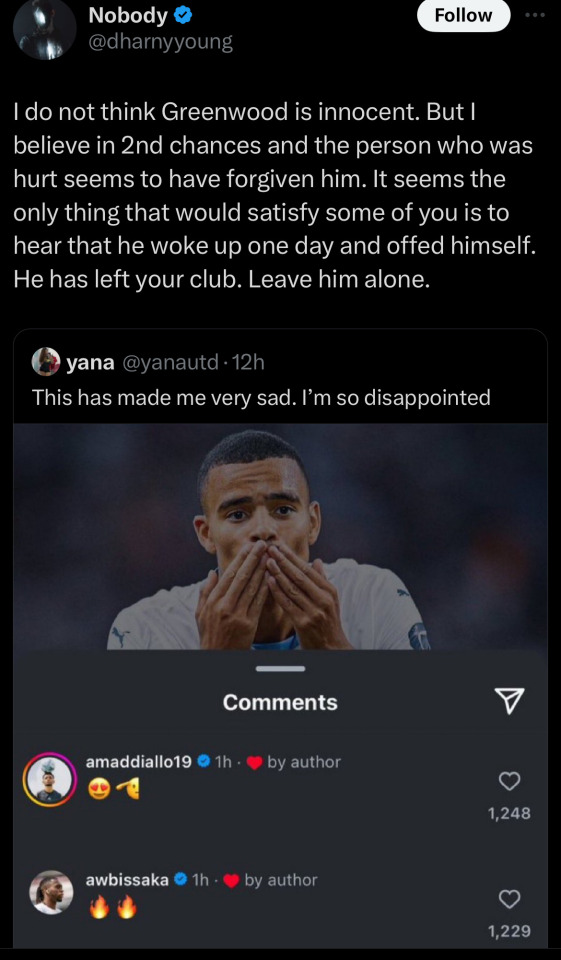
And yes. His girlfriend forgave him. And they now have a daughter together which is terrifying. But to this poor woman is nothing but trauma bonded to this man and her forgiveness doesn’t make him any less of a monster. She has NO ONE but him. When she came forward she got so much harassment and vitriol. Her own fucking family told her to forgive him because he’s a rich footballer. She had no resources, no support system, nothing. And what’s crazy is to this day this woman gets more hate and harassment than the man that abused and raped her. They hate her for being victimized by him and exposing that. They hate her for staying because she made a big deal for “nothing”. Again, men hate you. So much. I pray this woman finds healing and can get out of this situation. Sadly, I think it will have to take another escalation. No matter what, trust and believe males will have more vitriol towards her.
This is why I cannot for the life of me care about false accusations and men’s supposed fear of it. They try to convince us they’re not silencing victims when they immediately dismiss every woman who comes forward with a story of abuse/rape as a liar. They simply want to make sure innocent men aren’t getting their lives ruined. Meanwhile men that they 100% cannot deny did it (greenwood, playboi carti, Chris brown, etc.) literally face no repercussions. They still support them. It has never and will never be about the insanely rare instances of false accusations. It will always be about silencing women and protecting men.
Because if it was truly about the truth they’d be doubting males. When they’re accused of abuse or rape and obviously lie 99% of the time and say they didn’t do it and it comes out they did in fact do it, no one generalizes males as liars. No one is like “oh he said he didn’t. But so many men have and it turned out they were lying” but all it takes is a handful of women lying for every woman to be a possible liar. What a joke
#also another thing…..#stop stanning males and acting like they’re this uwu boy#esp athletes LOL. they cheat on their girlfriends and wives and run thorough women like they’re fleshlights#acting like it’s soooo surprising they don’t gaf about women is like being surprised that billionaires dgaf about poor people#the very people they exploit#radblr#radical feminist safe#radical feminism#radfem#i hate men#men hate you#moid moment#moids
55 notes
·
View notes
Note
Hello! What is the purpose of this blog and what are you advocating for? Is there a way to be a satanist without being problematic?
Well, for the longest time the purpose of the blog was to let people know that we were being sued by an abusive religious organization, to inform people about more specifics of that org, and to share good ideas that are usually not associated with modern Satanism due to its historical roots in cryptofascist and white nationalist ideas.
(Anton LaVey was worse than you think, and The Satanic Temple is its own miserable rabbit hole of reactionary ideas and histories.)
But now TST has finally stopped trying to sue us, so we're trying to figure out how to orient our priorities. Being targeted with online harassment and financial ruin for 4.5 years will definitely push something up on your priorities list, but also, nobody else seems willing/interested/capable of holding this subculture accountable. Given everything else going on, maybe it's not worth the energy for us, either — and without being sued, nothing ties the four of us together.
So at present, we're hibernating, backing up old social media posts on the website, and trying to help spread work other esoteric antifascists are doing, such as Capital Area Satanists.
youtube
[full ritual text]
Also check out S8N NOT H8N, the Global Order of Satan project about identifying good anti-bigotry metal bands.
As you probably have noticed, we tend to steer people away from Satanism because it's mostly a dead-end and populated with all sorts of vile, cringe, and otherwise off-putting people who fancy themselves better than they are.
But there's also some utility for lots of people processing specifically Christian religious trauma with ritual and intention, and you can find other people who share that orientation and interest. You just have to put in a lot of work to be proactively anti-racist and antifascist given the actual history of LaVeyan Satanism and its successors.
#ask me anything#satanism#Queer Satanic#anarcho-satanism#Church of Satan#The Satanic Temple#Capital Area Satanists#Global Order of Satan#S8N NOT H8N
40 notes
·
View notes
Note
hi! i saw ur post abt the jews & antisemitism. im not jewish (im catholic)and so i feel like i dont really know what u mean?? like ik what antisemitism is but like i genuinely dont really know how to recognize it other than ppl saying like I HATE JEWS of smth if that makes sense.... do u mind explaining a little bit of what u mean by antisemitism/what kinds- i wanna know so i can look out for it and like support my jewish peeps <3 THANK YOUU
hey nonny!!! thank you so much for the question and being so willing to learn!!! it really does mean the world that ur so willing to listen
i’m honestly not an expert, but i would mostly look out for a lot of common caricatures.
if someone talks about some “global elite” someone who controls hollywood, media etc that’s a pretty telltale sign of antisemitism.
some dog whistles i would look out for (but not all of them! i just cant list them all off the top of my head lol): HH (for ‘heil hitler’), 88 (H is the 8th letter of the alphabet), TJD, or “totally joyful day!” (TJD is actually short for “total jew death/destruction”), SS or ⚡️⚡️ (SS, or shutzstaffel was like the big army for the nazis essentially) and a tonnn of others im probably forgetting. obviously the swatstika but i dont think that needs to be said
anyone flipping the holocaust against jewish people IS antisemitism. i know it’s really the go-to bad event for a lot of people but it’s totally unacceptable. the holocaust was a terrible, traumatic event and a lot of if not all jews deal with some form of generational trauma and fear surrounding it. saying that jews or zionists are “commiting another holocaust”/“doing something as bad/worse than the holocaust” IS antisemitism.
some common antisemitic caricatures are big nose, devil horns, tail, looking greedy, rich, etc

this^ is the happy merchant picture. its a really good example of clear cut antisemitism. it portrays a stereotyped jewish man, with a big nose rubbing his hands greedily. he is also wearing a kippah (jewish headwear typically worn by men)
if you see a jewish person drawn with these kinds of things, or with their hands around the world or any shit like that, no matter how terrible they are it IS antisemitism. there are myriads of ways to express that you don’t like someone without resorting to antisemitic trops
i think the biggest thing is to believe jewish people when they say something is antisemitic. try to avoid mob mentality and think deeply (not saying like. you don’t think obviously not but try not to take things at fave value yk?)
i really hope this helped! this is by far not a complete list but i hope it was helpful in some way loll
again , thank you nonny for the question :)
29 notes
·
View notes
Text
potentially hot take that I will definitely live to regret posting BUT im genuinely flummoxed by the sort of moral outrage I see floating around the tags about how some people aren’t enjoying THG in the correct way because they just don’t (!!!!!) understand (!!!!!) that it’s (!!!!!!!) about child murder (!!!!!!). I’m sorry but we all understand that it’s about child murder. The child murder is on the tin in GIANT red lettering. It’s the most overt, extreme element of the premise and as such, Suzanne Collins uses it as a tool for asking more complex moral questions about trauma, warfare, selfhood, vengeance, governance, identity, resilience, etc. She uses it to explore multifaceted dynamics between characters who are framed as good and characters who are framed as bad and many characters who are somewhere in between. The fundamental question of the narrative isn’t “is child murder evil?” because that’s an incredibly basic question that we all know the answer to and it’s frankly ridiculous and insulting to our collective intelligence to imagine that we need to reiterate that every time we discuss the text.
THG is effective as speculative fiction because it engages with themes and ideas that are relevant to the world we live in — income equality, the violent acceleration of resource extraction, celebrity culture and the 1%, the commodification of people’s bodies and identities via social media, the increasing normalization of global war. But it is, and I cannot stress this enough, not real, and it’s in fact a very extreme exaggeration of reality. Just because SC was engaging with some questions about the ethics of entertainment does not mean we are the same as one of the fictional watchers of The Hunger Games if we enjoy diverse elements of the series. That’s not how fiction works, or at the very least it’s not how fiction must work, and I reaaaaaaally don’t think it’s a useful way to engage with this text.
I’m already cringing at the thought of how this discourse will continue as the TBOSAS release gets closer because TBOSAS is in many ways an even knottier text than the original trilogy, especially when viewed with the sort of reductive lens that boils any nuance down to the most basic sort of morality test.
656 notes
·
View notes